#I considered formatting this as an essay and going more in depth but I had actual assignments to do today so there wasn't time.
Explore tagged Tumblr posts
Text
Blog Post 4: Research
Hey there, everyone.
This blog post is an exciting journey into the in-depth research I conducted for my project on launching a Virtual Creative Writing Club. I can't wait to share it with you all.
As a passionate, creative writing student, I'm driven by the vision of creating an online community that not only nurtures creativity and fosters connections but also facilitates personal growth. The potential impact of this virtual writing club at my university is truly inspiring.
I have acquired invaluable knowledge and understanding through this process by diligently following these key steps:
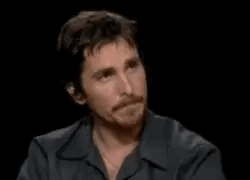
1. I RESEARCHED EXISTING CLUBS ON THE UNIVERSITY’S ORGANIZATIONS PAGE
Understanding the existing landscape was the initial and crucial step in the process. I kicked off my search by delving into the clubs already present at my university, gathering information and insights. Were there any writing clubs or organizations that met either in-person or virtually, where writers could connect and share their work? The findings of this research shed light on possible gaps that exist within the current offerings. Moreover, I contacted my professor for guidance on establishing a new club.

2. I DEFINED THE VIRTUAL WRITING CLUB’S PURPOSE AND GOALS
A clear vision for the club was essential, something that would drive our goals and shape our future. The unique aspect of a virtual writing club lies in the diverse range of perspectives and writing styles that members bring, creating a rich and dynamic community. I want to design a space that allows students to come together for collaborative writing sessions, workshops, and feedback circles, all conveniently accessible through an online platform. I also want the club to be a platform for writers across genres, embracing fiction, poetry, personal essays, and academic writing. With a clear purpose, I can effectively pitch the idea to the university and potential members.

3. I FOCUSED ON CHOOSING THE RIGHT PLATFORM
Selecting the right platform was crucial since this club would be entirely online. After researching various options, I considered a mix of video conferencing tools like Zoom or Google Meet for real-time workshops and writing sessions and Slack or Discord for continuous discussions, sharing resources, and offering critiques. Each platform had to align with our ease, engagement, and inclusivity goals.

4. MY NEXT STEP IS TO BUILD A TEAM
(THE STRONG 5)
Forming a core team ensures we have diverse perspectives and talents. We can brainstorm the club’s structure, including event formats, membership requirements, and outreach strategies. The collaboration will make the process smoother and more creative.
(4 MORE TO GO!)
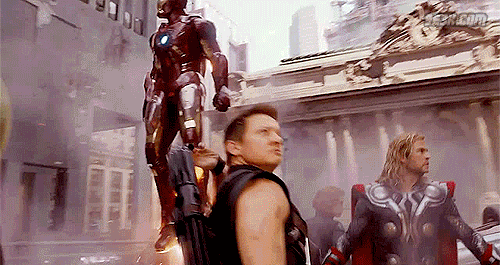
UNTIL NEXT TIME!
PEACE AND BLESSINGS!
The Speaking Box
2 notes
·
View notes
Text
Journalistic Essay
My journey into university has been a long and uphill battle. I was hesitant to apply to study journalism as I had doubts about my career path and capability to complete this course. What made me want to apply was a memory of me at 8 years old pretending to host a news show, I had my fake cup of coffee to my left and my makeshift “news script” on my right while wearing my grandmother's dress. I remember the joy I felt in those days at the idea that I might one day get to share my voice and my perspective with the world. My love for writing and storytelling transcends into creative writing, persuasive writing and songwriting. I knew that whatever pathway I decided to go down career-wise that writing would be a key part of my job.
I was extremely anxious in the weeks leading up to my first semester, I had been out of school for over a year and was unsure of how I would keep up and adapt to the structure of university life. The first few weeks of semester 1 were unsurprisingly stressful and a little confusing, there were many times I had gotten lost trying to find the right buildings or classrooms. I was also stressed about how I was going to remain organised and on top of my work. I consider those weeks to be the icebreaker weeks, they were messy and confusing, but I needed to go through the motions to find my balance. I found learning about the different types of writing styles and when to use them to be interesting and informative. I’ve always wanted to know more about the behind-the-scenes part of journalism writing and the industry.
Because of the hands-on approach to learning, I felt like I was in my element. I’ve always been a hands-on worker and feel I learn the best by doing and using my own intuition. I found the theory portion of hard news writing to be easy to understand but tricky to put into practice, I found myself making big mistakes such as not always using the correct grammar for attributing direct and indirect quotes and making sure the most newsworthy things were in the first few pars of my articles. To try and combat these errors, I decided to take on all the constructive feedback I was receiving from my teachers and put it into practice to perfect the quality of my articles so that they were up to standard. I found the feedback I’ve received from my teachers to be immensely helpful and insightful. I have thoroughly enjoyed the interview portion of the course; I loved having to research potential interviewees and topics.
I've met and interviewed some wonderful, intelligent people who have shared their stories and opinions. I’d say my favourite interviewees have been the Deputy Mayor of Darebin Council, Susanne Newton and Emily Leon who was the First Nations woman I interviewed for my partner colour story. I tried my best throughout the semester to uphold the values of Journalism which are Equality, Diversity and the Freedom of Opinion. I wanted to write articles that moved and engaged my audience. I faced challenges when it came to the format of some of the assignments, there were times where I was unsure of how to format certain articles.
I've learned the structure of hard news and soft news and how to put them into practice. I prefer writing soft news stories because there is more room to add context, depth and emotion. I have enjoyed and found learning about the theory and structure of hard news articles to be extremely insightful and something that I feel will help me in my career. My favourite article I've written this semester was my partner colour story, I wrote about Emily Leon who is a First Nations woman who was adamant on having a treaty before the voice to parliament. I found the process of writing the questions for the interview stressful but once the interview started, the questions seemed to flow. She was she a passionate and lovely person to chat to, I felt so grateful that she was willing to share her opinions and experiences with me in such a raw and vulnerable way. It was my favourite article I’d written; she gave me so much to work with a and I love writing meaningful, emotional stories.
Although I’ve mainly spoken about the good and enjoyable parts of this course/ subject, there were many hurdles along the way. I found myself spending most of my time studying, writing, rereading and editing my articles until they were up to standard. I found myself seeking a lot of advice from friends, and teachers that were helpful but at times would make me feel more confused. For the first six weeks, I couldn’t shake this feeling of being behind. I felt as though I was struggling with putting hard news structure into practice a lot more than some of my peers. I had to stop myself from comparing my abilities and work to my classmates. It made me really question whether my writing would ever be correct or good enough, for a while it made me question why I even applied for this course. It took some time and hard work to push through those feelings of comparison and self-doubt, but once I did, I started to enjoy my course more than I did before.
I have learnt so many valuable tools and lessons this semester. I've learnt what it means to be a journalist, how to find the most newsworthy angles and leads, how to uphold journalistic values and principles and most of all how to write professional hard news and soft news articles. I’ve met so many amazing teachers, friends, and people along the way. I'm looking forward to the next semester of this course and the next two years of university life at RMIT.
0 notes
Text
Okay @megsann13. I listened to Pure Heroine and Melodrama, so here's my song by song review of Lorde's music. I apologize in advance because this is long.
-----
Pure Heroine -
Tennis Court: Loved it! One of my favorites! Not quite sure why, but it gave me Taylor vibes and I really liked the sound. Also lyrics!!! "And I am only as young as the minute is full of it. Getting pumped up from the little bright things I bought. But I know they'll never own me". The whole song was just perfect lyrically but those stood out.
400 Lux: I liked it. Didn't stand out too much, but I enjoyed it. I would listen to it again. Nice vibes.
Royals: I've heard this one before. I really liked it back when it was on the radio all the time years ago. I think I enjoy it more now because I understand the lyrics rather than just appreciating the fun sound. I couldn't keep the Weird Al parody out of my mind while listening to it though lol.
Ribs: YES. Loved it. Lyrically, sonically, everything! Just wonderful vibes. 🖤
Buzzcut Season: I'd seen lyrics from this one before but never listened to it. The was also one of my favorites. "I live in a hologram with you" Looooooovvvvvveeeeeee
Team: I feel like I've maybe heard this one before. Was it on the radio? Anyway, I liked the sound a lot. When she sings "cities" I melt! Lovely song. The beginning is just so powerful. "Cause what this palace wants is release." 😍😭
Glory and Gore: My final favorite from the album. I can't explain quite why I enjoyed this one so much, but I really really did.
Still Sane: Not one of my favorites but I did like the beginning a lot. The vocals felt floaty if that makes sense. The background vocals were pretty throughout.
White Teeth Teens: I liked it. I listened to this one a few times in hopes I'd like it more but it didn't totally click with me. I expected to like it a lot more than I did.
A World Alone: This is definitely a song to cry while dancing alone in my room to and that's wonderful. Vibesssss.
Bravado: Poppy and peppy. I liked it. Added it to my pop playlist. Not sure it's a song I could listen to all the time but there's definitely moods for it. Overall a very good song.
Million Dollar Bills: Poppy, fun sound. Added to my pop playlist. Kind of same assessment as Bravado.
The Love Club: Funky beat. Liked the lyrics. Similar assessment to the previous two. Not sure I'll listen again, but it was fun. "What about the kid? It's time the kid got free. Be a part of the love club. Everything will glow for you"
Biting Down: The vibes. Yes. The song gave me like good anxiety. I felt a bit tense listening to it, but it was a good intensity. It elevated my heart rate and I'm not quite sure why. I kind of loved it. Next time I'm in a weird place mentally I might just put this song on repeat.
Swinging Party: A bit slow for my taste, but nice. I really focused on the vocals and lyrics for this one due to the music being a bit hushed and not distracting. I liked it.
Overall I'm not sure I'm going to listen to the album in it's entirety again, but I really enjoyed it. I added most of the songs to my main playlist so I'll definitely hear them again. I'll probably have some stuck in my head later.
Melodrama-
Green Light: I think I've heard the shouty part of the chorus before. I really like it! Added to my playlist and will listen again!
Sober: LOVE LOVE LOVE! So good! One of my favorites for this album! Vibessssss.
Homemade Dynamite: I liked the sound. It was a little difficult to focus on. I think I'm learning that I prefer her brighter sounding songs. None of them are particularly bright and poppy which I really like, but the brighter ones seem to be the ones I'm more drawn to. The darker ones just aren't heavy enough. I listen to mostly rock and metal so this has all been VERY lowkey and muted for me.
The Louvre: Again I got Taylor vibes. Not totally sure why. I it's think a combination of the lyrics and the the long notes that she holds into a crescendo. I liked it. I'll listen to it again eventually, but it wasn't my favorite.
Liability: Totally disregarding my previous comment about preferring the more upbeat songs, this might be my favorite of hers. Not even just from this album, overall. So sad. It hurt, but made me want to keep listening just to really FEEL.
Hard Feelings/Loveless: "I care for myself the way I used to care about you." MY HEART!! This whole song is a lyrical MASTERPIECE! Why am I heartbroken??? I've never even gone through a break up or had a relationship!! She's just that good!! All of the background sounds!!!!!! Soooo good!! I didn't really enjoy Loveless which was disappointing. It felt like a bit of a letdown after that first 4 minutes. I liked the ending lyrics but I just didn't vibe with the sound.
Sober II (Melodrama): Every time she says melodrama it cuts into my heart just a little. I felt lots of emotions. One of my top ones for this album.
Writer In The Dark: Okay so I love anything that uses the phrase "rue the day" so that gave it points. Her vocals in this are heavenly. Love it.
Supercut: Very nice to listen to. Could dance to it. Could cry to it. Overall really enjoyed it.
Perfect Places: Fun sound. Not one of my favorites but it was pleasant. I liked the lyrics.
------
So basically, even on the songs I didn't love I still had a great appreciation for the lyrics. All of the songs had a cool sound. It's not really my vibe but I still enjoyed it. I definitely plan on listening to some of those a lot more. It's hard for me to listen to too much music outside of the rock/metal genres at once so this was an interesting experience. I actually listened to almost all of it this morning but got busy and wasn't able to listen to two songs lol so sorry this didn't get posted until late in the day. (BTW my top favorites are definitely Tennis Court and Liability.) Time to go back to some of my usual music now but this was fun and pleasant.
#I considered formatting this as an essay and going more in depth but I had actual assignments to do today so there wasn't time.#Also I originally typed this in my phone notes lol#lorde#long post#music opinions#congrats to anyone who reads this whole thing#I promised to tell you what I thought of the music so here it is Megan lol sorry if I went overboard
1 note
·
View note
Text
How to write essays fast
I've been writing a lot of papers, so that's what's on my mind.
So this mostly applies to your standard 5-paragraph paper, though it's fairly straightforward to adapt it to longer (or sometimes shorter) assignments.
One of the main things to note is that essays are VERY formulaic, so knowing the formula and being able to write down your ideas in a way that fit into the formula is probably the number one way to get stuff done fast. Because of that, most of what I’m covering is breaking down the formulas so they’re more accessable.
Also this got very long. If there’s anything you want me to expand on just let me know in the comments or send me an ask/DM and I’ll make another post that goes more in-depth about it.
Structure (I hate this step, so I’ve figured out how to do it very fast becuase it’s still important)
The first thing to consider is prewriting and structure. To start, there are two major paper structures I usually consider. The first goes
Introduction
Main point #1
Main point #2
Main point #3
Conclusion
This is good if you have a lot to say on the topic, or if it's something closer to a summary essay where there's not really an opposing side. In something where there are distinct sides, (or if you have less to say to support your own side), you may want something that looks like
Introduction
Main point #1
Main point #2
Why the other side is wrong
Conclusion
The "why the other side is wrong" side is involves thinking through the MOST credible arguments the other side might make, and methodically breaking them down to show how they don't work. The stronger the argument you choose, the more effective this is.
Since I personally hate prewriting with a passion, I usually do this step very fast and end up with an outline that looks like
Intro [insert thesis statement]
P1: [three word summary]
P2: [three word summary]
P3: [three word summary]
Conclusion
(thesis statement, introduction, body paragraphs, and conclusion tips are all below the cut)
Usually, this is enough so when I look at my outline, I can see what I'm trying to focus on for each paragraph - and do so without straying from my main point.
For the prewriting, the main things to do are identify with basic structure of the two will serve your purposes better, and write a thesis statement that solidly supports your argument.
Thesis Statement
There are so many guides about creating thesis statements that are powerful, but I'm just going to quickly go over how to be fast about it.
The first thing to know is that a thesis statement is usually a complex sentence: it's your entire essay distilled down to a single line. The general formula I follow goes something like this:
"In their [media type] [name of specific piece], [creator's full name] explored/demonstrated/other verb [theme you're going to be arguing about] demonstrated/using/as evidenced/as shown by [example 1], [example 2], and [optional example 3]."
For example, a thesis statement that follows this format might go
“In his short film Job at Place, David Davidson explored the manifestations of human stupidity through the absurdity of the main character’s home, school, and office.”
Or, if you're writing a historical piece, it might look something like this:
"In [place/time period], [thing you're arguing was happening]: they had to/the conditions were such that/other thing to set up a list [example 1], [example 2], and [example 3]."
For example, a thesis statement that follows this format might go
“During the Tusken Invasion of 32nd century Tatooine, it was the lives of the children that were most affected, from their social development and connections with others to more personal struggles they didn’t yet have the tools to overcome.”
The examples you give are going to correlate to your paragraphs - example 1 is for body paragraph 1, and so on.
Introduction
I like to think of the introduction as a funnel that gets more and more specific.
First, write a broad statement that touches on whatever theme you’re referencing.
Job at Place is about human stupidity, so something like “while great minds have flourished throughout the ages, so have the not-so-great.”
Tatooine is about war, and about child development, so something like “children’s development has always been impacted by the state of the world around them.” or “war has many effects, many of which impact those not directly involved with the conflict.”
The idea is that it’s a broad statement that can almost be looked at like a universal truth.
Next, you’re going to go deeper - two sentences that narrow down the time and place you’re talking about specifically, and how that time and place fit into your universal statement.
The fourth sentence gets even more specific - introducing how the thesis sentence fits into your first three sentences.
Then the last line is your thesis statements.
Body Paragraphs
Your three main body paragraphs all follow the same formula. (I’ll get to the “why the other side is wrong” paragraph in a minute)
The first sentence you’re going to want is a topic sentence. For this, you’re going to want to look at the example you gave in your thesis statement that corresponds to this paragraph, and see how it relates to your central claim.
If we’re going with the Job at Place example from above, for the second paragraph, you might open with a line like:
��A striking characteristic of Davidson’s short film was the abnormality of the main character’s school, used to showcase exactly what happens when poor decisions get taken too far.”
Everything within the paragraph will then back up the claim you’re making in the topic sentence (which in turn is backing up your thesis).
For each paragraph, you’re probably going to want about three pieces of evidence, either in the form of direct quotes (plucking words directly from the source) or paraphrased quotes (summarizing what happened in your own words). The quote should be used to directly support your argument.
After each piece of evidence, you’re going to want about... twoish lines of analysis (this number can change as you need it to, but two lines is something solid to fall back to).
While analysis can take all kinds of forms, one pattern you can use if you’re stuck is
evidence sentence
what it means
how that meaning ties back into your main point
Following this pattern, a piece of analysis of Job at Place might look like:
“One of the first images of the private school is that it’s a tall spire with creaking stairs and loose floorboards. Despite this, the principal has eight personal cars parked outside on full display. While the first glimpse of the school might indicate that there is little money to care for the structural integrity, the notion is directly negated by the principal’s actions. By using these two images, Davidson demonstrates what can happen to the youth when those in power let greed carry them away.”
After you write your analysis, include some kind of transition phrase, and go onto the next piece of evidence.
The last line of your paragraph is going to transition into the next paragraph while also summing up the main point of what you talked about in the current one. (This line can also get moved down and tacked onto the beginning of the next paragraph, before the topic sentence, but I have found it tends to look less cohesive that way).
You might choose something like:
“While the school was a disaster in its own right, it wasn’t the only example of human folly.”
If you’re writing a “this is why the other side is wrong” you’re going to want to think about the MOST compelling arguments the other side could make. Take the top one (or two), and figure out ways to crack them apart using evidence from your source material.
In this case, your topic sentence might start off with something like
“While opponents might say [insert compelling counterargument], their reasoning breaks down when one takes into account the evidence.”
At this point, you’re going to follow the same formula as above. The main thing to keep in mind is that for the duration of this paragraph, your point is that the other side’s claim of X is wrong.
Conclusion!
If you know what you’re doing, this is actually the easiest part.
(wait, what??????)
The thing is, you NEVER want to introduce new ideas into your conclusion. Instead, you’re summarizing your main points.
The formula I follow per sentence is:
Thesis statement but reworded (you can change the sentence structure too)
Topic sentence for paragraph 2 or 3, but reworded (I’ll explain why you shouldn’t do the sentence for P1 in just a sec)
Topic sentence for paragraph 1 or 3 but reworded
Topic sentence for paragraph 1 or 2 but reworded
Wow sentence or question (i’ll get to this too)
The idea for the middle three sentences is you don’t want them to read as repetitive, so you’re going to mix up the order so it doesn’t match the order of the rest of the essay. This will help to keep it fresh.
The wow sentence is basically the last impression you get to make. I find it’s usually a good idea to go just a tad dramatic (it sounds dumb, but it has never failed me). If I can’t think of anything, a declarative statement on whatever major theme was being discussed throughout the essay usually does the trick.
Examples:
All of this shows that in the absence of friendships and platonic love, humanity will falter.
Fiction may seem far fetched now, but if the world falls into those same mistakes, it’s only a matter of time until it becomes a reality.
Art has existed for as long as humans have populated the earth; it’s not going away any time soon.
A lesson everyone must understand is the most powerful weapon isn’t anything physical or tangeable: it’s the ideas that exist in the minds of those who care.
(I told you they were going to be dramatic) A way I look at it is if you can’t imagine dropping the mic on the last line, it needs to be stronger (yes I found that plagiarized with not even a whisper of credit on Pinterest, but it works).
If you wrote a SOLID essay, consider ending with a question aimed at the reader (this will push your essay in the direction of either the positive or negative extreme: a strong essay will become stronger, a weak essay will become weaker). Questions can be a call to action or rhetorical as a means to drive home your final point. Becuase they’re more nuanced to the content of the essay, I don’t really have great examples to give you though (sorry).
Hopefully this is useful to at least some of you - good luck!
++++
Tagging:@candlemouse
If you want to be added to or removed from any of my taglists (found pinned to the top of my blog) just let me know :)
#writing#writing advice#writeblr#studyblr#writers on tumblr#essays#how to write essays#school papers#english#history#social studies#theme statements#thesis statement#conclusion#introduction#body paragraphs#homework#school#essay tips#writing tips#olive's writing vibes#long post
3K notes
·
View notes
Text
Setting the Stage - A “Triple Frontier” Criticism and Edit
Part 1 of 4
Words: 8.3k
Warnings: Discussion of canon-typical violence/gun violence, the US military, the drug trade, murder, racism, racial stereotypes, mention of character death.
Credit: Photos taken from IMDb
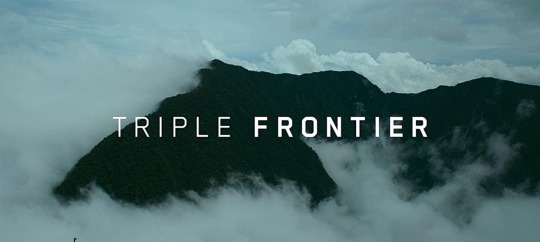
Hi my name’s E and I’m here to offer extensive criticism and a rework of what I consider a bad movie.
These critiques and changes are predicated on a familiarity with the movie, Triple Frontier. I will assume if you’re reading this you know the story and the characters; this won’t exactly be fanfiction, as I am not rewriting the entire movie, but I am taking the gist of the movie and changing some scenes and dialogue to give more character depth and better motivations, thereby strengthening the existing plot. Sort of a chiropractic adjustment. The overall story has the same narrative. The point is to say “Here’s how it could have worked or been more effective.” I’ll be using character names and nicknames interchangeably. Most ideas and criticisms are being given in bullet point format, with a few notable dialogue and scene changes written in story format. This is more of a conversation/PowerPoint than a refined essay; excitement and agitation means I’m able to actually get the words out. That being said, I apologize if I repeat myself but it’s for emphasis and to make sure the next thing I say is in the context I’ve established.
I'll start off by saying I watched the movie because it had some actors I like and I’m usually a fan of action movies.
I’m not going to get too in depth about the glorification of the US military that’s pushed regardless of what consequences do occur in the movie; the main characters are still framed as somewhat justified in the end because we never see any direct repercussions for the rest of their actions as far as being apparently-influential and still resourceful, highly skilled men going on a rogue money-grabbing mission by themselves with no oversight or accountability, and the antagonists are all portrayed as being mostly nameless, violent South American drug runners. Sure, Tom dies and they lose the money, but they still murdered SEVERAL innocent people and threatened/coerced even more into cooperation at several turns (their informant and her brother, the villagers, the kid with the Jeep, the boat captain, etc.), and they’re still somehow able to just leave and do whatever they want at the end?? Who is helping these people? There are hardly ANY supporting characters in this film??
So the critique is here because having seen the movie, I was disappointed. The movie was neither ‘good’ nor ‘enjoyable.’ By ‘good’ I mean that the story was weak, the characters and plot were not compelling, and there was no decent take away from it at all. I’m not saying all movies need to have some grand moral message at the end, but they do need a “why.” Why tell this story? Why does it matter? Why should it matter to me?
And as far as enjoyable goes, I mean that it wasn’t even a popcorn flick. It’s not fun. There’s no humor or levity (which I’ll come back to later), the dialogue/script was weak, the given scenario wasn’t compelling or complex or even that interesting to be honest, there wasn’t anything especially noteworthy about the flat characters, and the treatment of the antagonist/s and obstacles left much to be desired. (This is besides my complaints about the pro-US military vibe and lack of recognition of the US’s involvement in the drug trade history in South and Central Americas.)
What little I liked: The connection between Will and Benny showed through as a convincing brotherly relationship, which directors/writers somehow often get so wrong in movies. These two seemed like real brothers (especially in the way they fight after Tom’s death), and I liked the camaraderie between Catfish and Pope because those actors already have good chemistry with each other. The actors did okay with what they were given, but they weren’t given much. The scenery was pretty and the folks in charge obviously had the budget for the production value they achieved; it was a well-funded action movie, but that was about it. I didn’t care about the characters, so the people didn’t hold my attention in any emotional sense, and it didn’t really say anything at the end.
You could say the theme they were going for was “What will these people do in the most dire of circumstances with the biggest possible reward of their life in front of them?” but because we don’t care about the barely-introduced, two dimensional characters and because we have no levity, humor, or depth of character history to contrast the dire circumstances to, and because the actions they take are despicable (seemingly without any repercussions at the end), the theme is just left hanging. It's like the writers said “Ooh will these men resort to breaking their code of ethics for money???” but… We’re shown almost immediately that they do. And they do it again, and again, and again, doing increasingly despicable things as the movie progresses. On my rewatch of the movie, Pope has a line in Tom’s car in the first act when he’s trying to convince him to join where he says “And wasn’t most of the live combat you saw against the Geneva Convention technically?” and Tom says “Yeah…” Which is bafflingly bizarre to me that you would tell the audience to our faces that these men are self-admitted war criminals??? How on EARTH are you going to convince me to be on these guys’ sides of the story after a line like that??
Since we didn’t know much about the characters before the inciting event (Pope receiving intel about Lorea and the money), for all we know these men could have already been ready to make these decisions because they’d done them before. I don’t just mean killing people, I specifically mean murdering innocent people in cold blood for money because they’re wound tight and the probability of being caught continues to increase. They endure immediate physical consequences as they escape but we aren’t given a satisfactory resolution at the end for us to see any repercussions or sacrifices other than Tom himself dying (which didn’t impact me either) and signing over what’s left of the money to Tom’s family estate (which I also didn’t care about). The men don’t even convincingly show us there’s any significant emotional impact to losing him aside from the immediate scene where he’s killed.
This is besides the gaping plot holes of everything setting up the mission being far too easy and almost barely researched. It seemed like the writers said “They’re retired special forces, they already have all the contacts and gear and skills they’ll need to do the mission”. So much of their ability to get to Lorea’s house in South America was too convenient. “I know a guy, he owes me a favor” was the excuse we heard so often when we don’t see many of those alleged side characters on screen until they provide what the MCs needed, and we don’t see the trade offs/sacrifices to having what was needed at a moment’s notice. In short, it seemed like the writers were playing with action figures on a fun movie set instead of crafting circumstances that would weave these characters’ struggles together in a way that would have compelled audiences to care about the good in them and feel anguished when they start to slide against what should have been some sense of ethics. It was too easy for them to start shooting people (and yes, I’ll concede that this was one of the things they briefly addressed in the movie, but it didn’t work because I wasn’t given a contrast of their characters to care about).
So let’s talk about the characters. (Brief canonical details listed with my suggested changes)
Will ‘Ironhead’ Miller
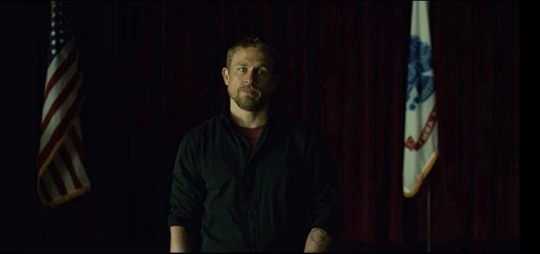
I had the initial impression that Will was supposed to be the moral compass of the group. He’s the most centered and mild, level headed and in control of himself. How he carries himself and how he speaks in that opening scene almost gave me the sense that he’s really dealt with the reality of returning from active duty and maybe even had some therapy which has helped him. I thought the rest of his speech was going to be “If this is the career choice you want to make, make it carefully because these are some of the consequences of what could happen when you return. Here are the ramifications for making the split-second decisions in the field that are being asked of you. Weigh your ethics and your constitution because this will be what you’re capable of; whether or not you choose this opportunity is still up to you.”
He tells the story in the beginning of the likely PTSD-induced episode at the supermarket, and it’s given to us/the other soldiers as a cautionary tale… At first. The second half of his speech after the break to Santiago’s introduction almost seems like a 180 because he’s encouraging the potential spec-ops soldiers to follow in his footsteps specifically “To be warriors”, saying they’ll be ready to exact violence at a moment’s notice because of their potential training (which I know is predicated on the idea of the US military elite being Super Cool and What You Should Strive to Be, The Best of the Best of the Best Sir with Honors).
What would have made this scene/characterization more compelling is if we’d seen that he didn’t actually believe what he was saying, he was just doing what he was required to, being paid to sell the idea of the military like every recruiter is, but he’s personally disgusted by what he has had to do (both in active service and by giving speeches he doesn’t believe in because he’s in need of money).
Easy fix? He tells Santiago exactly that in his conversation directly after. It would have been better for him to be the character most wanting to separate himself from his earlier career because the other clues and indications throughout the movie almost seem to allude to that, even though he’s also the one spouting the whole “we used to be warriors” bull, which I'm nixing from the retelling. (This won’t be the first time the writers have some weird contradicting characterizations.)
His reticence to join Santiago would have had more grounding. His careful keeping count of confirmed kills and more obvious remorse seemed to me like he was maintaining personal accountability, and his lack of initiating the first shot in the shooting scenes, his quiet reprimand of Tom in the helicopter after dropping off the informant and her brother, and his initiative to sign over the money first at the end all point to someone with a more fixed moral compass than the others of the group, and I think his quiet leadership is understated in a way that would have made his contrast and conflicts with the other men into a stronger character. I thought him asking the other men how many people they killed was supposed to be construed as holding them accountable and facing the reality of what they did in order to maintain their humanity and keep them from being trigger-happy in the future.
Maybe he only agrees to the recon because he thinks Pope is going to go through with it anyway, and he feels obligated to make sure nothing goes too far.
Maybe one of the bullets Tom took while in active duty was meant for Will or one of the others and Tom put himself in the line of fire to protect them, hence Will saying he thinks they owe Tom (it is unclear what exactly they owe him in the movie; an opportunity to make money? To regain a sense of purpose? Not sure.)
Maybe (and this is the line of thought I’m going to follow through with) he says he’ll do it if Redfly does because he genuinely thinks Tom will be able to keep the crew in line and run a tight ship (which would set up the bitter irony of Tom’s decisions later)
I think Will could have been established for us to see him as a strong choice for a leader of a group but he consciously chooses not to be because he doesn’t want that responsibility, he doesn’t want to have to take up the mantle of leadership even if others (any or even all of the guys) think he’s more than worthy of it
Because they respect him as the guiding moral compass
Going back to the idea of Will being our lens through criticizing the military life and how it’s the reason the five of them are in the positions they are, we could have even set Will up as working with the VFW or helping retired soldiers who had seen active duty reacclimate to civilian life, showing us that he’s seen what it’s like for so many, not just himself. There are plenty of first-hand real-life accounts of the government/military not providing enough proper care for discharged soldiers upon their return to civilian life; if we base where the characters start at the movie on that idea, then we know why they’re desperate, why they’re in need of money, why they’re struggling in their social circles and jobs, hence why some of them are willing to go to the lengths they do when they agree to the heist. Small moments of bitter cynicism or conflicted reluctance when they talk about the service didn’t have to be overt or even verbalized, it could have easily been conveyed through the characters’ mannerisms and tone of voice– Instead in the movie, the script has them touting the “We used to be warriors” BS as a way of saying “We used to do a cleaner job eliminating obstacles” instead of “We use to fight in the name of defense.”
It’s weird that they never say what branch of the military these guys served in, but my gut says special forces? The flag to the right of our view of Will in the above picture is a US Army flag, and it’s possible either his or Benny’s tattoos may have a clue, but that’s not enough for me since it’s implied these guys are more highly trained. Regardless, the movie doesn’t show us their internal struggle with morality because it’s not addressed in the beginning as being an issue. Yes, they talk about whether or not they’ve gone too far after they shoot a bunch of villagers, but I never felt that as an audience member because they still continued to make worse decisions. Part of that is due to the story naturally needing to up the stakes, but the tension wasn’t portrayed through the characters’ internal debate or personal conflicts between each other
Santiago ‘Pope’ Garcia
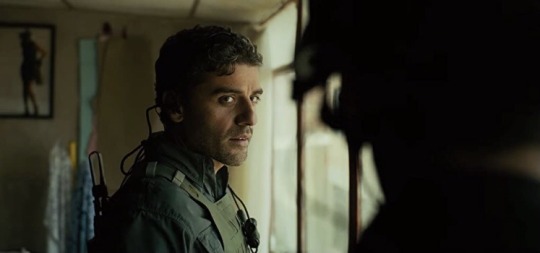
Santiago is the idea and resources guy, the hands of the operation. He’s focused on a mission, a goal that he can pull from his resources to accomplish. He’s the people-person, the contact-expert, the organizer, the voice the face the persuasion. He keeps a running catalog of people, names, places, favors, and skills, anything he can use at his disposal in order to get a job done. He likes to have a hand in being in charge and being in the know, and he likes providing answers when things go awry
Santiago is also framed as the main character (though even that is weak at best), which is why I think the struggles should have tied more to him than they did
That being said, because the plot and circumstances aren’t that deep, I personally think it should have been him in charge of the strategy, since he’s obviously smart enough and he’s the one with the initial intel— he knows everything about the given circumstances already. The fix? Give the characters internal conflict. Tom’s in charge is because Santi asked Will to be in charge first but Will wouldn’t do it, and not only that, Will wouldn’t come along unless Tom was in charge. Santi thinks Will is a stronger leader (and in the changed scenario he’s right), but for whatever reason Will thinks Tom is a better leader/more upright/whatever, and if it comes down to Tom being a former higher rank anyway, Santi has to bite his tongue and cede the position to Tom in order to ensure he gets Will onboard at all
This conflict strengthens when it comes out that Santiago has deceived them/“omitted certain truths” in order to tempt them into a solo mission instead of pairing with the agency he’s part of; Will has a deeper reason to be angry with Santi and it strengthens Will’s thought that Tom was the right choice to lead this in the first place (furthering what should have been the tragedy of Tom’s death, because it’s good for a character who is generally right and upstanding (Will) to have made the wrong choice in trusting someone. As is, Tom’s death was because of Tom’s greed, hubris, and wrong decisions.)
In the rewrite of the movie, making the heist itself more complex would at least explain Santiago’s need for someone other than himself to make the plan. The fix is to not give Santiago all the intel before their recon, let the five of them discover some of the potential dangers while they’re there (legitimizing their reason for having a recon mission in the first place), complicate the plan by making Lorea himself a fully rounded character, and have them formulate the plan together. Focus a bit more on the heist being a bigger part of the movie, not their escape.
This is a side note, but I think it’s important to address in the topic of fandom at large: Fanfic authors should be aware of how they might be characterizing Santiago as this sort of vocal, overly-flirtatious, sexually-charged character in their stories because we don’t actually get a lot of that from the movie itself; any reference to Pope being a ladies’ man comes from Tom. Tom’s the one who insinuates that Pope’s informant is A. a woman, B. an attractive woman, and that C. Santiago is sleeping with her.
Benny only makes a remark about Yovanna being Pope’s girlfriend after Tom does, and Benny’s the one to say she’s beautiful. Tom’s the one to again say “I knew it, I called it.” Santiago makes a brief rebuttal, but has no visible reaction in the movie; it would have been nice to see him bite his tongue or glare at Tom, just for a second, so we could see Santiago’s thoughts concerning Tom’s continued assumptions of his and Yovanna’s characters/relationships. Heighten the interpersonal tensions through the actors.
Santiago and Yovanna both deny that they slept with each other, and neither of them appear to be lying. Santiago genuinely does seem like he cares about her safety (shown through the lengths he goes through to ensure she gets away and is provided for, as well as having not told her any information that could lead Lorea’s men to her if they got to Santiago). If we go with the changed story where Santiago is only asking Tom to be on the team because Will told him to, his non-answers when it comes to Tom’s prodding can be attributed to him having to bite his tongue and redirect the conversation back to persuading Tom to join the mission
Tom also makes a somewhat racist comment about not having seen Santiago for a few years, thinking he’d “Gone native down in the jungle.” Maybe Tom has a history of saying little things like this that get under Pope’s skin. They can all still have this friendly brothers-in-arms camaraderie, but even real-life friends make crappy insinuations you don’t always get to call them out on.
Now why do I think this is an important distinction? Because the “sexy Latin lover” stereotype is one that is a consistent problem in both media and fandom spaces, and I’ve specifically seen it attributed to Oscar Issac’s characters quite often. I understand a lot of fanfic writers write romance, but there comes a point when how someone speaks about an actor/character of color plays more into a stereotype than what we’re actually given even in the source material, especially in this case when the comments about Santiago’s relationships with women come from Tom, who we all agree is pretty much The Worst (so why should we take what he says about Santiago at face value anyway?)
And yeah I know the point of fanfic is often to pick and choose what parts of canon we incorporate, and to do what we see fit with the characters, but this is specifically a racist stereotype that I think people need to be more aware of when it comes down to writing Santiago’s character
Onto Santiago’s flaws: Ambition, greed, impulsiveness, and a lack of accountability. He sets himself up to make the wrong decisions in forgoing the partnership with the agency. I think he’s aware that Will would be able to direct and delegate to the rest of the men, keep them calm and focused. Maybe he’s aware that he’d be too keen to do things his way, and he doesn’t want to strongarm them into helping because he does need their help and he does trust his friends, and he needs for his focus to be on Lorea
He’s the one to suggest doing this mission on their own without government/agency oversight. He lays out the most well-laid plans in order to coax the other four of them into helping pull this off because it should be easy and he can’t do it without them. He has the strategy, he has the intel, he has the resources, now he just needs the hands.
Tom ‘Redfly’ Davis
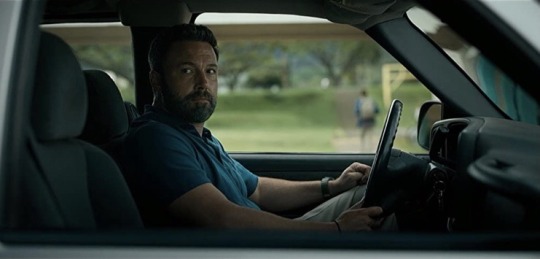
Tom as he stands in the movie is framed as the head. We’re told that he’s the strategy-minded planner and leader .
Tom already seems like he doesn’t have much left to lose at the beginning of the movie, which is why I think his marriage should have been on the rocks instead of already over. We get the introduction of his daughter Tess and the strained relationship he has with her, and then she’s never mentioned again whatsoever. He hasn’t adapted well to a civilian job and he’s an alcoholic, and while all of this is in line with struggles returning vets face (often in accompaniment with PTSD), it seems like he’s already given up because those relationships are already over. If he doesn’t have anything to substantial to fight for, then why is he willing to take the risky recon mission even if it does pay well? There’s no tension if we already know he’s only there to get the money for himself.
Again, I think Santiago should have logically been the head of the op because nothing Tom strategized is that difficult to pull together. Santiago could have come up with that exact plan to enter the compound and kill Lorea, because he already knew the family would be at church on Sunday. The only thing Santiago doesn’t seem to have is the actual lay of the land. This is a weak point in the plot itself, being that the recon wasn’t really that hard to accomplish, because it should have at least set up that the actual mission, once they decided to do it themselves, would be more difficult (especially with it just being the five of them instead of a full team).
If we established that Tom did have more at stake back home, he could have been more manipulative in how he gets the guys to go along with his commands. Heighten interpersonal tensions by having him telling Will to think of Benny, and by relating to Catfish by telling him to think of his family. It would give his own greed credence, and give the men forward motion to push through their own reluctance (because in the film, the guys already show us they disagree with Tom while they’re packing the money. It was too early to show the team Tom has already morally failed as a character.).
It’s important to note that after Will gets shot, Santiago is ready to call it and make a safe trek through the jungle each with what they can carry, and Tom is the one to overrule. Santiago was in control, and the movie could have ended there if Tom hadn’t pushed past it.
One of the failures of the script is in framing Tom as someone who pushes for what he wants (taking longer to ransack the house, overloading the vans, pushing to carry the full load on the helicopter, wanting to cover up their tracks by killing Yovanna and her brother), but not actually making his verbal arguments anything stronger than a complaint. This is a failure where they tell the audience he’s pushy instead of making stronger cases by showing us. He repeats himself, but doesn’t say much more than what he’s already said before (“Are we really going to leave this much money on the runway?”) before the guys cave to his demands, nor does he do anything to physically intimidate or motivate them, hence my suggestion to make him do more to scheme, persuade, and strongarm them instead. Some of the rewritten scenes in following installments will exemplify this.
Frankie ‘Catfish’ Morales
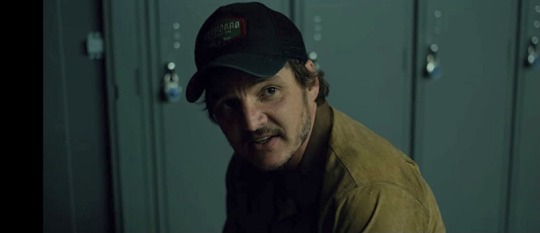
Frankie is the most visibly and verbally reluctant to go through with the plan: he’s our voice of reason. He doesn’t seem like he wants to go in the first place, he has good reasons for not going, and even when they do get down to Lorea’s house, he doesn’t seem as keen to pack in the extra money (although it is important to note that he does go in search of another wall to break through and get cash from; erasing what we do see of Frankie’s own greed would change the character and interpersonal dynamics entirely, so it’s important to acknowledge that he’s got the same temptations as the rest of the men, or else we would logically have had an entirely different story— How these details are portrayed in the movie are contradictory without having solid grounding).
That being said, I think we could have had one of the most interesting dichotomies in a character: the voice of reason who caves to peer pressure.
Because of how lacking the script is, we don’t actually get a solid reason why Frankie agrees to the mission (I’ll explain my own idea further down). The times he’s asked to do something he’s already vetoed or said no to before, he caves the moment one of the guys (usually Tom or Santiago) asks him a second time with no actual change in what they say or how they say it, and we’re not given a reason to believe why he makes his decision. Santiago persuading him to be their pilot doesn’t take much convincing in the long run, and Tom only gives two rebuttals during the helicopter takeoff scene before Frankie says “Okay, she’ll make it.” (That’s not how helicopters work and he would have known that. The blades can’t pressurize the air to climb higher, and every pilot worth their salt knows it too. It’s not like physics stops existing because you want something bad enough). It would have been better for Tom or the others to put up more of an argument, or band with each other to push against his verdict, or go behind Frankie’s back when he disagrees.
Many people have interpreted his agreement to go along with the recon as him wanting to keep his teammates alive, only going down to make sure that he can fly them out, and while I like that interpretation, I think it gives the movie too much credit. However, because I like that interpretation, I think it could be fleshed out with just a little more dialogue in his scenes (which I’ll add to later), but like I’ve mentioned, we really needed to see more of why these characters were desperate to begin with so that we could realistically believe the motivation of greed.
The reason I think it should be more apparent that he’s acting out of a sense of responsibility to the group is because realistically, Frankie should already know the moment Santiago says he needs him that this isn’t just a recce; why would Santiago need “the best pilot [he] knows” if this is supposed to be a quick in-and-out reconnaissance mission? If they’re working with the agency and they’re just there to get the lay of the land and the house, he wouldn’t be needed as a pilot. Why would they need the helicopter in that scenario? What are they flying in, or what are they flying out?
So now we say Frankie knows that Santiago is planning to go rogue and haul the money out of South America from the start. That, in addition to the fact he’s a family man now, should be why he’s reluctant in the beginning, because he knows his friend won’t be satisfied just setting up the plan to get Lorea. He knows that Santiago is going to rope them into something more, and he worries that if he’s not there to get them out of trouble, they could get hurt. (All these guys suffer from serious brothers-in-arms ride-or-die loyalty, which is a great flaw to exploit, but it means they would make terrible friends in real life.)
Now for the reason why Frankie does have his own sense of greed? Consider this: Frankie says he has a new baby, and he also tells Santiago he lost his pilot’s license because of a coke charge (another point for the military failing discharged soldiers is that without treatment for [likely] PTSD, servicemen will sometimes turn to illicit drugs as a means of coping).
If he failed a drug test and lost his license, you could imply that he’d lost his job. And with his wife (?) so late in the pregnancy and/or just having had the baby, what if he didn’t tell her about either of those facts, and STILL hasn’t told her?
So NOW we have a man with two huge secrets, dwindling savings, and a family to care for (after a huge medical cost) who don’t know just how badly he’s screwed up, and has been lying to them about it. That is a compelling character motivation to take a dangerous job to receive a lot of money in a short amount of time, even before the promise of millions once they’re there. You guys have seen The Incredibles.
Frankie seems susceptible to being swayed especially when his friends butter him up when it comes to something he’s good at (“ ‘Fish. I need a pilot. I can’t do this without you.”), and while part of being the Mom Friend™ is that you feel a responsibility towards your friend group as the voice of reason, you also feel guilty always having to be the one to say No and you tend to want to keep an eye out when you know they’re going to do something that could get themselves hurt.
It makes for an interesting contrast in his character, especially when we get to see hardened Frankie as the voice of reason when they’re at their most desperate, a fact that is highlighted during the scenes involving his skill sets: getting the men to wrap up in the house and head to the van, figuring out the weight problem prior to takeoff, flying and subsequently crashing the helicopter, driving the Jeep and finally snapping at the others near the beach, insistent and hard and capable and forceful
Part of both peer pressure and being the Mom Friend is that your feelings are constantly side-lined. It’s why the guys are more mad about the mule falling off the mountain, not even seeming to realize that Catfish almost died. It’s why they continue to pack in the money, even though he says there’s a weight issue. It’s why it’s so weird and jarring for them when he finally does snap about the teenagers.
So maybe we have Santiago realize the necessity in appealing to his men’s humanity instead of their cold-hearted logic, because that is more in line with how Frankie ends up making decisions at the end of the movie
Benny Miller
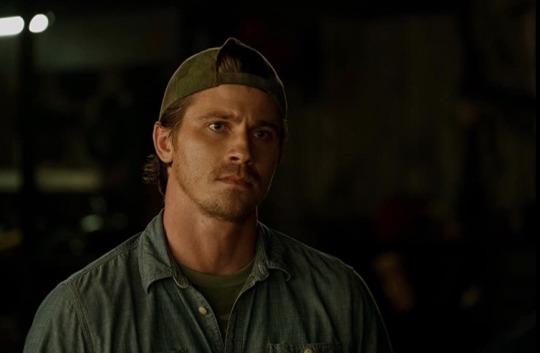
Benny, along with Frankie, barely gets an introduction, and it’s honestly laughable (which I’ll get to in a minute when I talk about editing). Obviously he needs the guys to focus and not distract him before a match, and I’m fine with him being the one to initiate the domino effect of getting the guys in on the heist, but it would have been better if it had happened after he lost the match. Have him angry and frustrated and tired of getting his face knocked in for less money and losing sponsorships, and that’s enough for him (as a presumably young single guy) to say yes to a quick buck via work that’s more in his wheelhouse like Pope is offering.
Criticism on the editing in the film: You know what happens instead of a full character intro? Benny says yes, the guys sort out some tentative details right before the match but as soon as the bell rings and the fighters tap gloves, Benny gets socked in the face and the movie immediately jump-cuts to an aerial shot of them driving in South America! We see Benny first, blinking blearily in the back of the Jeep, and you know what that edit conveys to the audience? Benny got knocked out in one hit and they dragged him unconscious to the airport, got him to stumble onto a plane, and he passed out in the car. You’re really going to tell me this guy is an accomplished MMA fighter? Because that’s absolutely not what the movie told us.
Now overall, I think Benny is the heart of the group. He’s the most openly emotional, whether that be toward excitement at greeting Pope in the locker room, Tom agreeing to plan the heist, or about the amount of money they hauled, or the open fear/worry directed toward Will when he gets shot or toward Catfish directly after the crash, or angry at the sloppiness of the job in the house: (“What was that?! We don’t leave messes like that!”). He’s immediately distraught and openly weeps at Tom’s death while the others are in shock before reacting.
Interesting note, I see people write him as rather cheerful and goofy, when he’s fairly solemn for most of the movie. He has those moments of excitement like I mentioned, and while he’s impulsive and his younger age is shown in contrast to the other men in some of his scenes, he’s definitely not a cheerful guy. I just think he’s the most open about those emotions and wears his heart on his sleeve. The other guys seem to have more reserve, so Benny being the heart is a good contrast. He holds them accountable and doesn’t hold back what he’s thinking.
It’s also interesting to see Benny and Catfish’s bond; Catfish is early to fight night, Benny yells his name first when the chopper crashes (instead of, you know, his brother with the gunshot wound), and it’s Catfish who yells that he’s going to kill people as they’re racing to the beach if Benny isn’t there when they get there. Personally my idea is that Will and Frankie (before he lost his license) both worked at the military academy, so Catfish knows both of the Millers pretty well, and Benny sees him as the same kind of brother in arms/responsible type that Will is. You could say Frankie is more compartmentalized about killing people in the name of necessity than Will might be (“As many as I had to.”), but I also read Will keeping track of confirmed kills as a way of purposefully bearing the burden of what he’s had to do, instead of killing people without regard to the lives he’s took. I think that’s conjecture based on canon because of Will’s weird contradictory characterization, but that’s the direction I’ve chosen to write him.
I don’t think Tom is as close to the rest of the guys because even if they all served together like it’s implied, I think it’s inferred that Tom would have been their CO, and it’s hard to be friends with your boss when you’re bound to complain about them at some point. You don’t invite your boss to a barbecue you want to relax at.
Lorea
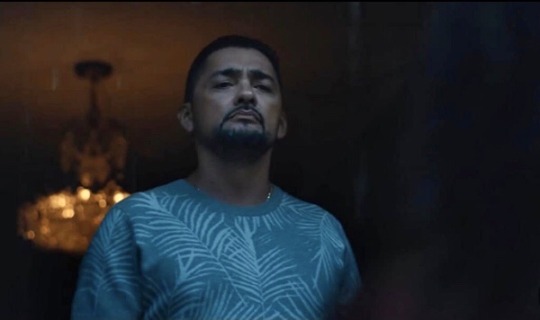
This is important: In the movie, Santiago makes it a point to say how imperative it is that they kill Lorea, and he specifically takes that responsibility on himself. When it comes to the scene where he kills Lorea, Santiago shoots him twice more after he’s already dead (presumably for good measure). The camera lingers on Santiago as he does it. That tells us this was much more personal to him than we’re really led to believe in the movie, because we aren’t given much about Lorea’s history.
Overall, Lorea is a bit of a non-character. He doesn’t actually have any personal connection to our main characters (most notably Pope), his only line is a single word, and we’re given no depth to him either other than the fact he’s family-oriented and somewhat religious. For all the movie’s intents and purposes he’s a shadowy drug kingpin who kills people indiscriminately (though we’re not given a reason for the executions at the tennis courts) and has a lot of money hidden in his personal home in the jungles of South America, and the framing/editing of his death scene puts so little weight on him as a person opposing Santiago that I didn’t realize it was him that Santiago shot until I watched the movie a second time. I was confused the first time around because I thought he was just another security guard.
I know the movie was trying to make it obvious how much of a Bad Guy™ he was so the characters we’re supposed to root for (and by extension we as the audience) don’t feel guilty for what the main characters do, but that’s shallow writing because he’s made into a racist, two-dimensional caricature of a violent Latino drug lord
It’s fine for an antagonist to be a static character (meaning they don’t have any growth or change in a story), but it’s not okay for him to just be an obstacle whose death is barely a blip on the radar of the MCs. I’m not saying there has to be a long and involved history, but we should have had one or two more scenes of him at the house, and the scene where Santiago kills him had to have more significance than making Lorea a prop.
Additionally, show us the familial and business connections as an extension of Lorea. We know his men set out after the MCs, so make it about more than just the money. Lorea’s men want revenge.
Because he has no personal connection or scenes with any of the main characters, there’s zero emotional tension concerning him. He doesn’t have to be some tragic figure or more nuanced villain, he can be a violent drug lord, but if there’s no emotional tension or history at odds with Santiago then he doesn’t really serve the purpose of the story in any meaningful way.
The fix? Two things: Santiago has to give us specific details about Lorea as they gear up for the recon, there needs to be an established history he’s working from, we see scenes of Lorea in his home separate from the protagonists, and Santiago actually has to confront him in the house. There has to be an exchange of dialogue, and to further complicate things, the family shows back up at the house before the guys get out in time. Show us the actual consequences of Lorea’s death and the heist itself, and it will heighten the tension for the rest of the movie as the guys frantically try to make their escape. Now there’s emotional consequences for what the main characters do, and it’ll hang over every other decision they make through the rest of the journey.
Yovanna
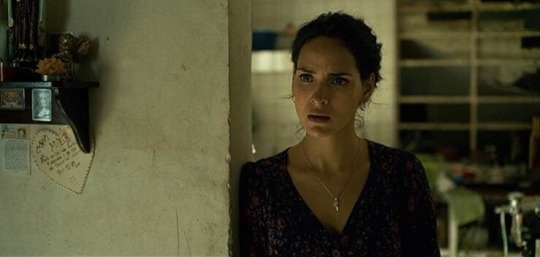
I liked Yovanna. She was earnest, determined, and entrenched in survival mode. Even for as little as we got of her and for how unfortunately stereotyped I thought her role was (just by nature of the given circumstances), I thought the actress was compelling and did what she could with what she was given. It would have been better for her character to have been involved with Lorea’s operation only because her brother was involved and when he screwed up something in his role, Yovanna volunteered to work for Lorea as a way to pay off her brother’s debt in the hopes of keeping him alive until they could both find a way out (which is where Santiago comes in). I don’t think we got a reason why she’s involved in the first place, and her brother again just seemed like a prop to complicate the MCs plans instead of an actual person.
This is a side note but she was hoofing it in that chase scene and I was impressed. She really sold the escape.
I honestly thought her and Pope’s dynamic was good because she’s doing what she can to escape with her and her brother’s lives, and it’s a good complication to have when Santiago needs her as a reliable informant so he can do his job AND keep people safe, while also asking her to take on additional risks the closer they get to eliminating Lorea. She knows this operation and wants out. Pope doesn’t know everything and wants in so they can all go home, with one violent drug lord finally gone for good.
What I especially loved was that there truly never seemed like a time that conveyed to us that they had slept together, but there was a chemistry that underlined the hint that, in a different time and under different circumstances, they might have taken an interest in each other. As it stands, Yovanna tentatively decides to trust Santiago, and we can see that Santiago truly does want to see her safety through to the end, regardless of his personal feelings.
Yovanna had guts and I was really relieved that she got to live. Action movies fall into the habit of killing the one woman to further the emotional toll on the men so I was happy to see her escape.
Now onto the tone of the movie, which will play into themes and character complexities.
One of the biggest failings of the movie was not addressing why they were desperate to begin with. Focusing a critical lens on how the military screws over folks once they’re discharged didn’t have to be lengthy or overt, you could have simply set it up around the same time Santiago talks to Will and never needed to mention it again. The US military has a history of coaxing people into service without giving the full terms of the deal and then not caring what happens to folks after they’re out of service, especially if they retire by choice
The movie starts off serious and grows even more serious as the characters’ morality takes a nosedive. It’s an action drama, that’s fine, but because we don’t get any solid moments of levity or humor, there’s nothing substantial to contrast the drama to. I keep coming back to The Losers, which is definitely a comedic action movie, but there are moments of sincere dramatic tension and stakes that show us the contrast and depth of realness the characters are put in. I’m fine with Triple Frontier being a drama, but if they had shown us glimmers of hope in each of these men, if we’d incorporated more than one side of their character into the entire movie, if we had seen moments where these men were good or at least had potential to be good, we as the audience would have felt more tension because the stakes would have been higher.
As is, it seems like these desperate men would have already been willing to take the measures they do when the plan starts to slip through their grasp; there’s no tension to the question “What are they willing to stoop to?” because they just go right ahead and do it, and then continue doing it, and since we don’t have much to go on in terms of their personal lives or ties with each of the other four men in the group, there’s no emotional pull to seeing their resolution.
The fix: Have a scene in the beginning where we introduce the characters in a lighter setting all together, but where they can’t out-and-out talk about the mission, or incorporate the family members into the scenes we see Tom talking to the men like the scene we get with Tess. Have a barbecue Friday afternoon/night or set the scene during Tess’s lacrosse game. Maybe Tom and Molly’s marriage is dangerously rocky but they’re not separated, get the families and guys together, show us what they have to lose. Keep Tom from being there just yet because he’s caught up at work so Santiago has to go to him the next day anyway. THEN we can get into how they’re still desperate for money, they’re all struggling in different ways, and give Santiago a bit more of a challenge in persuading them but show that they still might be inclined to agree to the recce because things aren’t as good as they seem just under the surface.
You can still follow it up by Santiago going to Tom at Will’s behest, and we can still really get into the meat of the logistical discussion the next day at fight night. I bring it up because we MAYBE get five lines each from Catfish and Benny in the movie before Benny gets presumably knocked out in the ring and then??? Jumpcut to South America??? Who are these guys? We know almost nothing about them, we don’t know how they factor into the group or what these five are like all together prior to extreme circumstances
Anything that follows should always be introducing the characters. We need to see the light starting to drain from their eyes as the story continues. I think the violence was used too liberally and at the point of the village sequence I honestly stopped being affected by it because the stakes stopped being real; there was no sense of restraint or balance in how they navigated each obstacle. Any obstacle with a human element could just be solved by shooting or threatening people, and as an audience member, it meant that any time they encountered a new problem, I was left asking myself why they didn’t shoot people because it had solved most of their problems so far. I don’t care if it’s a violent action movie, but the violence has to mean something or it just starts to be gratuitous and loses any effect.
I’ll address Tom’s death when we get to it, but it was also one of the biggest failings because 1. We already didn’t like him as a person or character 2. His death wasn’t a plot twist, it was the logical progression of events —> 3. Because of his own greed and wrong choices so —> 4. It didn’t strike me as a tragedy because of all of the aforementioned lack of character depth and interpersonal dynamics. If you’re going to kill off a main character it has to mean something. He didn’t sacrifice himself so there’s nothing to admire. Logically, he got what was coming to him. They gave us nothing to assume there would be any effect back home either. And in the end, I don’t get the impression the audience was surprised or affected by it, because it seems like everybody agrees that Tom is The Worst™. Death is not character growth. The compounded narrative issues left us asking the question “Was this movie supposed to be a tragedy?”
Now why am I writing this in the first place? Nobody from the movie itself will ever see this post, and it doesn’t change that a poorly written movie was produced, so why do I care?
I care because I want to see better stories written. I want to see better stories get the chance at having this kind of budget and opportunity. In short, I think we’re entitled to ask for better movies and we’re entitled to criticize bad ones, especially when they have such harmful overtones like Triple Frontier.
With this new setup in mind, I’ll move forward in 3-4 more posts with tweaked scenes, additional commentary and criticism, and speculations for what could have been.
#Triple Frontier#Santiago Garcia#Frankie Morales#Will Miller#Benny Miller#Tom Davis#movie critique#movie rewrite#my writing#I’m just going to post this lol#Triple frontier fanfiction#except it isn’t really at the moment lol#Pedro pascal#Oscar Isaac#Ben affleck#garrett hedlund#Charlie Hunnam#Adria arjona
44 notes
·
View notes
Text
Ahistorical, Absurd, and Unsustainable (Thanks + Sources and Further Reading)
This post concludes the essay-as-written. I'm going to try to get a full version up on AO3 within the next few days, which I will link here (ETA: here) and on my tumblr generally. It will have properly hotlinked footnotes and a table of contents. It will also probably be all in one chapter, as it was intended to be read, with the exception of the resources below.
Thanks to @codenamesazanka, who provided me a lot of useful links to resources on Japanese law when I was still just spitting overheated hypotheses into the void. Thanks also to @robotlesbianjavert, @aysall and my tumblr-less BF for their game beta-reads, their catches of some grammar and spelling mistakes that would have ranged from annoying to mortifying, and for the checks on my thought process and organizational flow. Thanks to everyone in my chat group for putting up with me when I had a mini "oh god what am I doing I'm not a lawyer" meltdown over my first draft Logistics conclusions.
And thanks to all of the people on tumblr who read and reblogged this! If any of you want some further reading on the topics I discussed, or if you just want to double-check my information, see below to conclude:
Ahistorical, Absurd, and Unsustainable: An Examination of the Mass Arrest of the Paranormal Liberation Front
Introduction and Part One Part Two Part Three Part Four and Conclusion
Sources and Further Reading
I tended to start with Wikipedia and then either follow their source links or Google for further information when I needed more detail or to clear up the occasional bit of conflicting information. Unfortunately, I wasn’t thinking quite far enough in advance to save a link to every single source I used, but I’ve done my best to either dig them back up in retrospect or find another source relaying similar information.
All direct quotes, excerpted panels and canonical information comes from Viz's official translation of My Hero Academia or My Hero Academia: Vigilantes.
///
Overviews on the pre-war Japanese incidents I cited for comparative purposes:
The March 15 Incident
The February 26 Incident
The Rice Riots. Further information sourced from the rather more detailed Japanese page.
The formation and immediate ban of the Farmer-Labor Party.
///
General reading on uprisings, riots, coups, and protests that otherwise got out of hand.
The Era of Popular Violence
Rebellions in Japan
Attempted Coups in Japan
///
On Aum Shinrikyo and the sarin gas attacks:
Wikipedia has some basics, but further information was sourced from a Congress report on Aum some seven months after the attack and this Aum retrospective written last year.
The Wikipedia page on Underground.
For another story wrestling with these topics, consider giving the anime Mawaru Penguindrum a whirl. Without explicitly telling you that's what it's doing, it deals with the difficulties—stigma leading to ostracization, depression and radicalization—faced by the children of a fictionalized Aum Shinrikyo expy some years following an equally obvious fictionalized expy of the sarin gas attacks, as well as critically depicting the state of society that may have lead members of Japan’s “Lost Generation” to cults like Aum to begin with. There’s a good but spoilerific breakdown on that aspect of the show here.
///
International referents:
India’s Million Man March, and a BBC report on the arrests/detainments.
An article about a lawsuit brought by the ACLU over the Baltimore arrests, and the cite on 24-hour releases.
This article is my source of the 1,200 number on the mass trials in Egypt. This one is a more in-depth look at the problems with the trials, while this one shows that the mass trial problems are still ongoing.
///
Japan’s laws:
The Peace Preservation Laws
English translations of the Penal Code and the Subversive Activities Prevention Act.
An overview of the state of criminal conspiracy law in Japan circa 2007, looking at the first incarnation of what would eventually become the 2017 law.
A scathing opinion piece on said 2017 law.
A citation on the Subversive Activities Prevention Act being invoked against Aum, and only Aum. Dated year-of, but there have been no invocations of it since, despite Japan seeing a marked upswing in anti-new religious movement sentiment after the sarin gas attacks.
///
Japan’s penal system:
A broad overview on Wikipedia.
Two sources for numbers, one less recent, but with more context and detail here; another with the most recent numbers available here.
Cite for 2018 number of arrests.
///
The trial process and criminal justice:
An exhaustive report on the structures, status, and proceedings of criminal justice in Japan at every stage from the initial arrest to post-release services circa 2019.
The Wikipedia article on pre-trial detention cells in Japan, which has a decent overview of why they’re controversial. See also the entry for the role of confessions in the indictment process.
Cite for the number of deaths caused by law enforcement in Japan in 2018.
An overview on lay judges, and an article on the Japanese public’s broad discomfort with the system.
A good article on the high conviction rate and what activists call “hostage justice.”
Another good article on the conviction rate, this one touching on several of the aspects I mention about lenient sentences and coerced confessions, as well as some that I didn't, like corrupt or compromised judges.
A broad look at attorneys in Japan and, buried in an article on the lay judge system because I could not for the life of me find the interview I read that talked about it, a citation for the unpopularity of defense attorneys. (Footnote 365)
A Wikipedia page for Yasuda Yoshihiro, who I quipped about in a footnote and refrained from explaining further. Long story short, he’s maybe the example of an unpopular defense attorney in Japan, an anti-death penalty activist who has served as defense in a number of high-profile cases, absolutely the most notable of which was that of Asahara Shoukou, the leader of Aum Shinrikyo.
An interview with the CEO of Cross Career, an employment agency founded by an ex-convict and dedicated to helping others like him find work. Talks some about the stigma around felons and how it impacts recidivism in Japan.
///
On children in Japan:
An exhaustive rundown on the state of alternative childcare in Japan.
An article about the way children’s independence is founded on a strong faith in their community, and a post that mentions the TV program Hajimete no Otsukai (My First Errand).
///
On AEDs:
An article from relatively early on—back in 2007—in the rollout. From the following year, there’s this rather drier but informative article from a medical journal discussing the effectiveness of the movement thus far and steps that could be taken to make the public more confident in using the devices.
///
Further relevant My Hero Academia meta:
Tumblr user @codenamesazanka has posted some excerpts and discussion about Murakami’s Underground and how the issues Murakami raises can also be seen in My Hero Academia.
My take on the MLA and quirk supremacy, part of a much longer piece covering my general lore on the MLA, its members, and its history. For some more specific discussion on why I think the series itself supports the view that the MLA at large was not as hardline quirk supremacist as Geten claims, see Geten’s section “On Quirk Supremacy (and Re-Destro, still)” in this post about my headcanons for the canonical MLA members.
15 notes
·
View notes
Text
“Book People”: a response

I have been thinking about an essay I read on Jezebel for the last while. It fit in so nicely with something I have been mulling over for months: readers. I mean serious readers. The kind of people that track their reading, that keep up with the publishing industry, that can relate to bookish memes, that overthink how their bookshelf is organized, and that seek out like-minded readers to interact with on social media. This essay, by Joanna Mang, uses a phrase for these kinds of readers: ‘Book People’. Mang uses it in a derogatory manner, and I have heard it used as such before though in those cases I believe the phrase Book Snob would have been more fitting. For Mang, Book People, are not the good sort of reader, but I want to unpack that in a bit.
Mang’s article is titled “We Have to Save Books from the Book People”. I actually only found it through a response written at Book Riot by Tika Viteri (“Back-Talking the Tone Police: Book People are Not Your Enemy”). Essentially, after rereading Mang’s essay a half dozen times (to try and follow the meandering argument and to seek what the point was) I think Mang is arguing a few things: that classics should still be taught in high school and not argued about on twitter, that English teachers bear no responsibility to encourage reading, and that Book People are bad for liking books a whole lot and have a Secret Plot to keep the publishing industry running. What any of this has to do with the title of her article remains unclear.
Mang opens her essay by complaining about people complaining on twitter. Specifically, people that are complaining about the classics they had to read in high school. The Great Gatsby, The Scarlet Letter, and Catcher in the Rye are all mentioned. Even more specifically Mang is upset at the redundancy of these arguments, that they come up again and again. I mean she is definitely correct, because once someone talks about something no one else is allowed to talk about that thing ever again. Ever. Right? I doubt it is the same person rehashing this conversation daily, more likely Mang has stumbled across or perhaps actively searched out these conversations as they are being had by different people. I mean as far as I know there are more than a handful of people using twitter, right? And if it is the same person dredging up this conversation daily, I have a suggestion: unfollow them. Problem solved. But then if that had happened, we would not have this essay to unpack.
Mang seems upset that people on twitter say that they felt forced into reading books that they did not enjoy. According to Mang anyone that disliked these books did so because these books are classics that they just failed to understand. Mang mentions that with a good lesson plan anyone can like classics, but perhaps they did not have a good teacher with a good lesson plan or maybe it is because they just did not connect with the book. Not everyone must like classics simply because they are part of the canon. A book’s inclusion within the canon does not mean that it is necessarily enjoyable to read or study for every single person. It simply means that it was influential in some way. I can recognize and value the significance of a classic novel and still also dislike the reading experience.
I did find it ironic that these conversations on twitter are doing exactly what Mang says she encourages her students to do: “When I teach literature, my goal is to give students the tools and confidence they need to attack and write about texts, to “talk to” the text rather than receive it passively” (Mang 2021). On these twitter threads we have people reflecting back on books that they were required to read in school. But because they are engaging with these texts on twitter it cannot count as the same thing? I have come across some fascinating analysis on classic books on social media that would have made my English professors proud. I fail to see the problem here.
Mang then goes on to speak about the notion of whether certain books should or shouldn’t be taught in school to avoid “turning kids off” reading, since this is often an extension of those twitter conversations. This is something that people in education have been honing for years. A quick google search reveals many theories, pedagogies and lesson plans that can help encourage reading. Teachers and other education experts are out there exploring options to encourage reading in their students. Why though? Why do we want turn children in to readers? Mang suggests that Book People have an odious plot to save the book-as-object which I will unpack in a moment. But maybe it is actually because it increases empathy? Or because it builds vocabulary? Because it prevents cognitive decline as we age? Because it is a stress reducer? Might even make you live longer? Improves general knowledge? Improves writing skills? Aids sleep? Could even help prevent alzheimers? I think it could be at least one of those reasons, especially since most of these studies explain that these benefits do not come from reading those three books back in high school but as a sustained habit over a lifetime. Though Mang, an educator, also states in her article “It’s not an English teacher’s job to make students love reading; an English teacher’s job is to equip students to read and communicate” (Mang 2021). Which I think is certainly true, but (thankfully) many other educators are attempting to go beyond the pressure to yield good test results and are still trying to help their students become readers. Of course, as Mang does mention, the formation of a sustained reading habit is based on more than a single factor (Mang mentions “parental attitudes, family wealth, the student’s disposition and other sources of stimulation”). Why this should excuse English teachers from even trying to encourage reading is lost on me. Further I also wonder what the point there is in teaching students how to actively engage with books if they are not continuing to read outside of school? Why bother with English class at all if this is the case?
I am not here to say that schools should not teach classic literature or should not encourage students to engage with the canon, I am here, however, to say that we can also all go on to complain about it on the internet afterward. If someone does not find value in these conversations, then they are free to tune them out.
After talking about education and American schools’ reading lists, Mang finally gets to the part about Book People. Mang differentiates between readers and Book People stating:
“A reader is someone who is in the habit of reading. A Book Person has turned reading into an identity. A Book Person participates in book culture. Book People refer to themselves as “bookworms” and post Bookstagrams of their “stacks.” They tend towards language like “I love this so hard” or “this gave me all the feels” and enjoy gentle memes about buying more books than they can read and the travesty of dog-eared pages. They build Christmas trees out of books. They write reviews on Goodreads and read book blogs and use the hashtag #amreading when they are reading. They have TBR (to be read) lists and admit to DNFing (did not finish). They watch BookTube and BookTok. They love a stuffed shelf but don’t reject audiobooks and e-readers; to a Book Person, reading is reading is reading” (Mang 2021).
Let’s dig into this before we get to the conspiracy. Just because I am baffled by the snobby tone of this paragraph, and I do not understand what is wrong with any of this.
A Book Person has turned reading into an identity: Just as many people do with any hobby, they tend to entrench themselves within it. People who hike seriously can and have turned that into an identity, they’re hikers. But just about everyone can walk so hikers should then not make their hobby part of their identity? Sometimes people really, really enjoy something and it becomes a big part of their daily life. What is wrong with that?
A Book Person participates in book culture: A culture can form around a social group. So, if we have a hobby group, which is a kind of social group, it is not hard to imagine that eventually a culture would build up around it. So then, yes, people would then also participate in that culture.
Book People refer to themselves as “bookworms”: What I am most puzzled by are the quotation marks, as if this nickname is something strange and new. The first known use of the phrase bookworm dates back to the 1590s and is defined as “a person unusually devoted to reading and study”. Yeah, it is a little dorky, but many hobbyists across various hobbies have silly names for the people of their hobby. Star Trek fans call themselves Trekkies or Trekkers and apparently train enthusiasts call themselves railfans. It’s a hobby thing.
and post Bookstagrams of their “stacks”: As for this, I think this is an example of a fascinating development among readers. Robert A. Stebbins, a scholar of leisure activity and hobbies, has long denied that reading could be considered a ‘serious’ hobby or what he refers to as a Serious Leisure Pursuit (SLP). He has maintained that reading is a prime example of a casual pastime, and even explores his stance in more depth in the book The Committed Reader: Reading for Utility, Pleasure and Fulfillment in the Twenty-First Century. He argues that reading cannot be a SLP due to the solitary nature of reading and the lack of a social world. To Stebbins a social world is a social network group made up of hobbyists and others connected to that hobby. Social media has changed that, however, allowing serious readers to form a social world and also find ways to make the act of reading more social itself. Book clubs have always been an attempt by readers to make reading more social. But social media allows these attempts to get closer to the mark. Readers on twitter host reading sprints to encourage people to read together at the same time. Others host read-a-longs on various platforms such as instagram to encourage a more engaging version of a book club that invites readers to read the same book section by section. And some booktubers (Book People on youtube), host live videos that invite their subscribers to grab a book and read with them. I will digress here for now, but this is something I plan on exploring more on this blog in the future. Put simply, what Mang is disparaging here is actually evidence of reading achieving SLP status under Stebbins’ hobby model. This is simply an active social world of readers.
They tend towards language like “I love this so hard” or “this gave me all the feels”: This is simply how people tend to talk on the internet? Especially amongst fandom communities, of which there is huge overlap in bookish communities. This is hardly exclusive to Book People.
and enjoy gentle memes about buying more books than they can read: memes are things people share on the internet. I am failing to see the issue with this. Again, not something exclusive to book people. What I am starting to see here is that Mang seems to take issue with internet culture in general, more so than with Book People.
and the travesty of dog-eared pages: Only Book Snobs care if other people dog-ear their own books. I am using the phrase Book Snob to distinguish between avid readers and people that find the book-as-object almost sacred. There can be overlap, certainly, but not all Book People see books this way.
They build Christmas trees out of books: No books were harmed in the making of those christmas trees. Oh, is this where the title comes in? Are we saving books from becoming christmas trees? I promise it doesn’t hurt the books.
They write reviews on Goodreads: I am confused by what is wrong with this. Mang stated earlier in her article that and I quote again, “when I teach literature, my goal is to give students the tools and confidence they need to attack and write about texts, to “talk to” the text rather than receive it passively.” How is reviewing a book not doing exactly that? Not all reviews are as aggressive as an essay can be perhaps, but it is still an act of engaging with a text rather than simply consuming it. Further, many Book People likely either have access to or want access to ARCs (advanced reader copies) from publishers and part of that deal is writing an honest review in exchange for the free copy of the book. So that would be them holding up their end of that deal. I am uncertain if Mang takes issue with goodreads in particular or with writing reviews in general.
and read book blogs: People that are active within a hobby often seek out other like-minded individuals. And beyond that most book bloggers are reviewers. Meaning people may be seeking reviews of a book to help them curate their reading selection.
and use the hashtag #amreading when they are reading: another example of Mang’s dislike of internet culture. People use hashtags to help get their media piece to others that may enjoy it or find commonality with it. They are using this form of metadata as it was intended.
They have TBR (to be read) lists: I think non-serious readers have TBR lists as well, but I think they tend to be more unconscious in nature. For example, a non-serious reader may vaguely know that there are some classics that they want to get to, or maybe the latest hyped general fiction novel. Book People are hobbyists, and if we used Stebbins’ model, they are serious hobbyists. They take their chosen leisure pursuit seriously and as such it is on their mind a lot because they intend to spend a significant amount of time pursuing that activity. So, it seems only natural that they may want to organize the content that they want to consume. It appears to me that Mang is more upset that this hobby group has formed in-group vocabularies. This means that only people residing within the group will understand some of the words or phrases used. This is a natural progression of language. You need words to succinctly capture the meaning of something. In this case, many readers have lists of books they want to read, rather than saying all of that it gets shortened down to TBR.
and admit to DNFing (did not finish): Are we saving books from not being fully read? Many of the books that Book People are reading are for enjoyment. If you are not enjoying something, why would you continue it? Do you watch the entirety of a season of a tv show that you are hating? No. Finish a snack that is making you want to vomit it back up? No. Same logic for books. To suggest you must complete a book simply because it is a book is more like Book Snob behaviour. This seems so common sense that I am again inclined to point to this as evidence of Mang’s distaste for in-group vocabularies more than the idea of not reading a book.
They watch BookTube and BookTok: This is further example of the community and social world that readers are setting up on the internet. People typically like making connections and further, making connections over something you share in common is natural. The internet made this easier, and social media has made it easier still. This is just evidence of readers seeking connections with other readers.
They love a stuffed shelf but don’t reject audiobooks and e-readers; to a Book Person, reading is reading is reading: This line is fascinating. Because following this, Mang’s article takes a turn toward a conspiracy about how Book People are trying to save the book-as-object since ereaders have threatened the physical book. And yet here, as part of her definition of Book People, she disparages Book People for finding value in ebooks and audiobooks. Mang herself becomes the Book Snob here, rejecting other book formats. Ebooks are convenient, you can have access to hundreds of books from your chosen device (I like to use my phone personally not an ereader). And audiobooks are great for when you are performing another task such as chores or driving. Both formats also allow people with disabilities better access to books. Audiobooks are perfect for people with visual impairments or who struggle to read. And with ebooks the size of the font can be changed to allow the book to be turned in to a large print book as needed and can even allow the font to be changed into a dyslexic-friendly font. To suggest that ebooks or audiobooks are not real books or don’t count as books is just blatantly ableist.
Let’s get to the conspiracy now. Mang claims that reading became an identity and a culture in response to the decline of interest in reading. She also continues on to say that not only is reading threatened by other media and diversions, but that ebooks and audiobooks distract from physical books. And so with the book-as-object threatened by television and alternate book formats, physical books became more precious. She even goes as far as to say books are fetishized. And then Mang says, “This could be why those arguing that classic books alienate young readers suggest 21st Century titles as substitutions: if we want to keep the book alive, we have to read, and more to the point buy, the books being produced now” (Mang 2021).
So let’s make this clear. According to Mang, Book People are people who have made reading an identity and revel in book culture. And Mang also already said that Book People “love a stuffed shelf but don’t reject audiobooks and e-readers; to a Book Person, reading is reading is reading”. But then Mang changes her argument and says that all of this is about the physical book. So, the people that complain about classics they read in high school on twitter, some of which are Book People, are all actually attacking classic literature because it may turn children off reading which would be bad because that would mean that less people are reading books regularly which is bad because then it means that less people are buying books which is bad because the book-as-object is precious and must be protected and perpetuated.
Riiiiight. I believe Mang conflated Book People with Book Snobs partway through this essay. They are not one in the same and by Mang’s own definition, Book People see any format of book as worthwhile. Meanwhile a Book Snob would uphold the physical book-as-object as the supreme format. So saying that Book People are behind this conspiracy simply does not hold up under scrutiny. Not that this conspiracy should carry much weight at any rate.
But then Mang wipes that argument away, saying that Book People are not that practical. That actually their purpose in complaining about classics books on twitter is solely to revolutionize American schools’ text selection policy. Further Mang seems to think that people ranting about their least favourite classic novel on social media is all about putting pressure on teachers and public education to shape their students into model human beings. When in reality, sometimes one simply needs to whine about a bad book, even if it’s a classic.
At the end of all of this, I am left simply confused about this essay. Firstly the title: “We Have to Save to Save Books from the Book People”. What books are we saving from Book People and how exactly do we go about doing it? Are we saving classics? Or are we saving the current school reading list books? Or physical books? Or ebooks? Perhaps it is that books are somehow being ruined by those that worship that book-as-object? I propose that Mang just thought it sounded good, especially seeing as how it does little to pertain to the wandering argument of this essay.
Secondly, I am also confused about what exactly is the point of this essay. The three main conclusions reached at the end of it seem to be that 1) arguing about classics on twitter does not impact text selection policy in schools, 2) teachers bear no responsibility in encouraging their students to make reading a habit, and 3) that books are not sacred objects. So what?
While I disagree with Mang’s essay, I do still find value in some of the points she brings up, and in her definition of Book People. I have been casually curious about the leisure studies, and where committed readers fit within leisure studies, for the last couple of years. Mang may not understand what she sees before her, but she did see something. It is that insight that has finally spurred me to dig into the social world of committed readers, or as Mang calls them, Book People.
#booklr#book blog#readers#bookworm#bookstagram#booktube#amreading#bookish#book people#paperback revolution
11 notes
·
View notes
Text
Superman’s 10 Best of the ‘10s
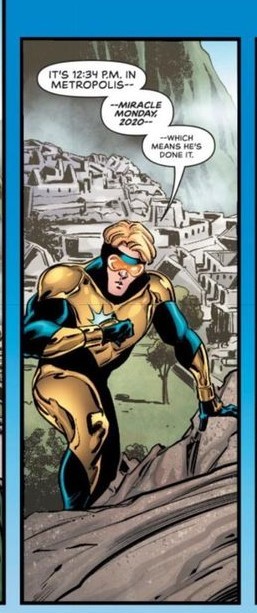
Good Miracle Monday, folks! The first third Monday of May of a new decade for that matter, and while that means that today in the DC Universe Superman just revealed his secret identity to the world on the latest anniversary of that time he defeated the devil, in ours it puts a capstone on a solid 10 years of his adventures now in the rear view mirror, ripe for reevaluation. And given there’s a nice solid ‘10′ right there I’ll go ahead with the obvious and list my own top ten for Superman comics of the past decade, with links in the titles to those I’ve spoken on in depth before - maybe you’ll find something you overlooked, or at least be reminded of good times.
A plethora of honorable mentions: I’m disqualifying team-ups or analogue character stories, but no list of the great Superman material of the last decade would be complete without bringing up Cave Carson Has A Cybernetic Eye #7, Avengers 34.1, Irredeemable, Sideways Annual #1, Supreme: Blue Rose, Justice League: Sixth Dimension, usage of him in Wonder Twins, (somewhat in spite of itself) Superior, from all I’ve heard New Super-Man, DCeased #5, and Batman: Super Friends. And while they couldn’t quite squeeze in, all due praise to the largely entertaining Superman: Unchained, the decades’ great Luthor epic in Superman: The Black Ring, a brilliant accompaniment to Scott Snyder’s work with Lex in Lex Luthor: Year of the Villain, the bonkers joy of the Superman/Luthor feature in Walmart’s Crisis On Infinite Earths tie-in comics, Geoff Johns and John Romita’s last-minute win in their Superman run with their final story 24 Hours, Tom Taylor’s quiet criticism of the very premise he was working with on Injustice and bitter reflection on the changing tides for the character in The Man of Yesterday, the decades’ most consistent Superman ongoing in Bryan Miller and company’s Smallville Season 11, and Superman: American Alien, which probably would have made the top ten but has been dropped like a hot potato by one and all for Reasons. In addition are several stories from Adventures of Superman, a book with enough winners to merit a class of its own: Rob Williams and Chris Weston’s thoughtful Savior, Kyle Killen and Pia Guerra’s haunting The Way These Things Begin, Marc Guggenheim and Joe Bennett’s heart-wrenching Tears For Krypton, Christos Gage and Eduardo Francisco’s melancholy Flowers For Bizarro, Josh Elder and Victor Ibanez’s deeply sappy but deeply effective Dear Superman, Ron Marz and Doc Shaner’s crowdpleasing Only Child, and Kelly Sue DeConnick and Valentine DeLandro’s super-sweet Mystery Box.
10. Greg Pak/Aaron Kuder’s Action Comics

Oh, what might’ve been. In spite of an all-timer creative team I can’t justify listing this run any higher given how profoundly and comprehensively compromised it is, from the status quo it was working with to the litany of ill-conceived crossovers to regular filler artists to its ignominious non-ending. But with the most visceral, dynamic, and truly humane take on Clark Kent perhaps of all time that still lives up to all Superman entails, and an indisputably iconic instant-classic moment to its name, I can’t justify excluding it either.
9. Action Comics #1000
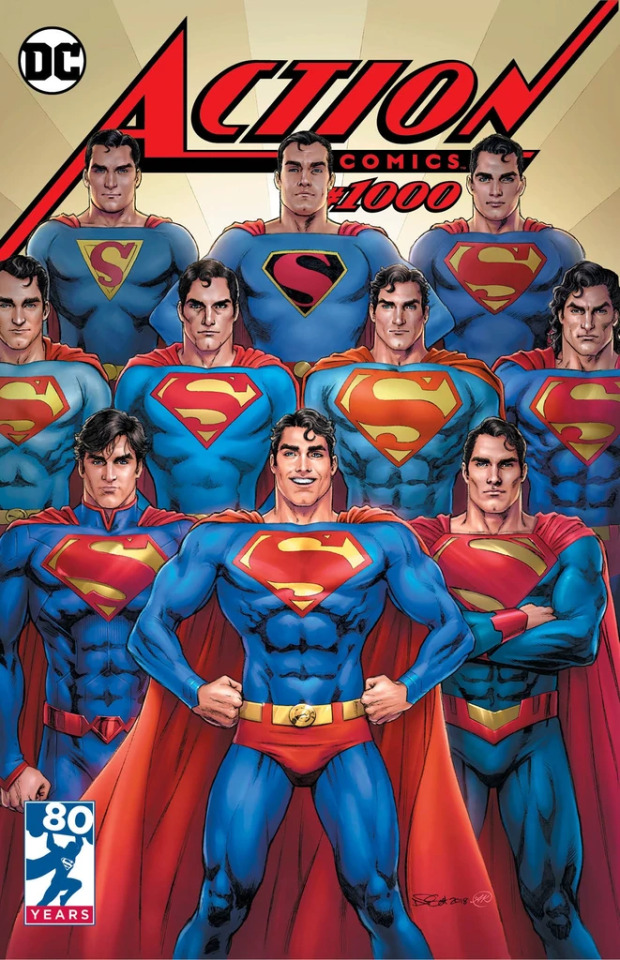
Arguably the climax to the decade for the character as his original title became the first superhero comic to reach a 1000th issue. While any anthology of this sort is a crapshoot by nature, everyone involved here seemed to understand the enormity of the occasion and stepped up as best they could; while the lack of a Lois Lane story is indefensible, some are inevitably bland, and one or two are more than a bit bizarre, by and large this was a thoroughly charming tribute to the character and his history with a handful of legitimate all-timer short stories.
8. Faster Than A Bullet
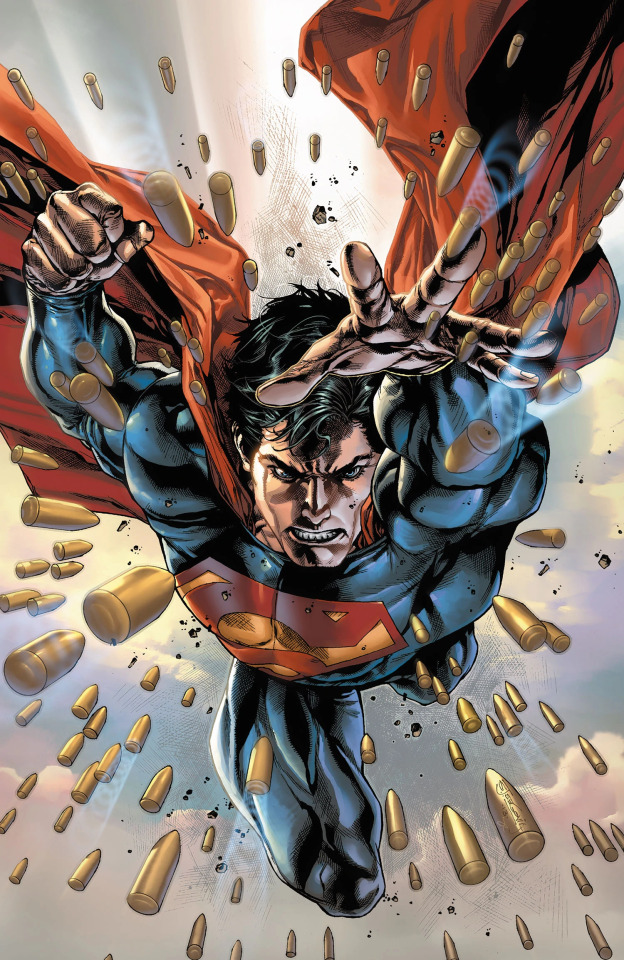
Much as Adventures of Superman was rightfully considered an oasis amidst the New 52′s worst excesses post-Morrison and in part pre-Pak, few stories from it seem well-remembered now, and even at the time this third issue inexplicably seemed to draw little attention. Regardless, Matt Kindt and Stephen Segovia’s depiction of an hour in the life of Superman as he saves four planets first thing in the morning without anyone noticing - while clumsy in its efforts at paralleling the main events with a literal subplot of a conversation between Lois and Lex - is one of the best takes I can recall on the scope on which he operates, and ultimately the purpose of Clark Kent.
7. Man and Superman
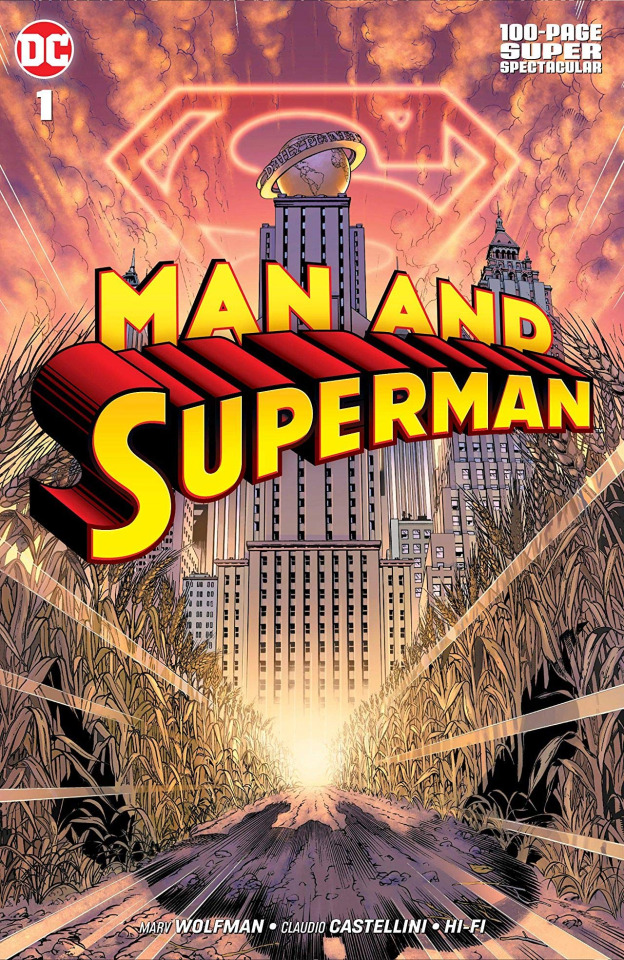
Seemingly geared on every front against me, built as it was on several ideas of how to handle Superman’s origin I legitimately hate, and by a writer whose work over the years has rarely been to my liking, Marv Wolfman and Claudio Castellini’s Man and Superman somehow came out of nowhere to be one of my favorite takes on Clark Kent’s early days. With a Metropolis and characters within it that feel not only alive but lived-in, it’s shocking that a story written and drawn over ten years before it was actually published prefigured so many future approaches to its subject, and felt so of-the-moment in its depiction of a 20-something scrambling to figure out how to squeeze into his niche in the world when it actually reached stores.
6. Brian Bendis’s run
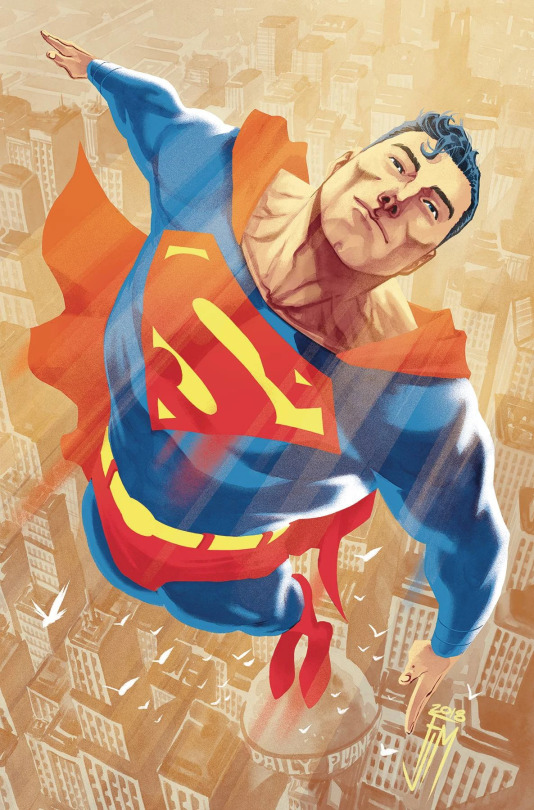
Controversial in the extreme, and indeed heir to several of Brian Bendis’s longstanding weaknesses as a writer, his work on The Man of Steel, Superman, and Action Comics has nevertheless been defined at least as much by its ambition and intuitive grasp of its lead, as well as fistfuls of some of the best artistic accompaniment in the industry. At turns bombastic space action, disaster flick, spy-fi, oddball crime serial, and family drama, its assorted diversions and legitimate attempts at shaking up the formula - or driving it into new territory altogether, as in the latest, apparently more longterm-minded unmasking of Clark Kent in Truth - have remained anchored and made palatable by an understanding of Superman’s voice, insecurities, and convictions that go virtually unmatched.
5. Strange Visitor

The boldest, most out-of-left-field Superman comic of the past 10 years, Joe Keatinge took the logline of Adventures of Superman to do whatever creators wanted with the character and, rather than getting back to a classic take absent from the mainline titles at the time as most others did, used the opportunity for a wildly expansive exploration of the hero from his second year in action to his far-distant final adventure. Alongside a murderer’s row of artists, Keatinge pulled off one of the few comics purely about how great Superman is that rather than falling prey to hollow self-indulgence actually managed to capture the wonder of its subject.
4. Superman: Up In The Sky
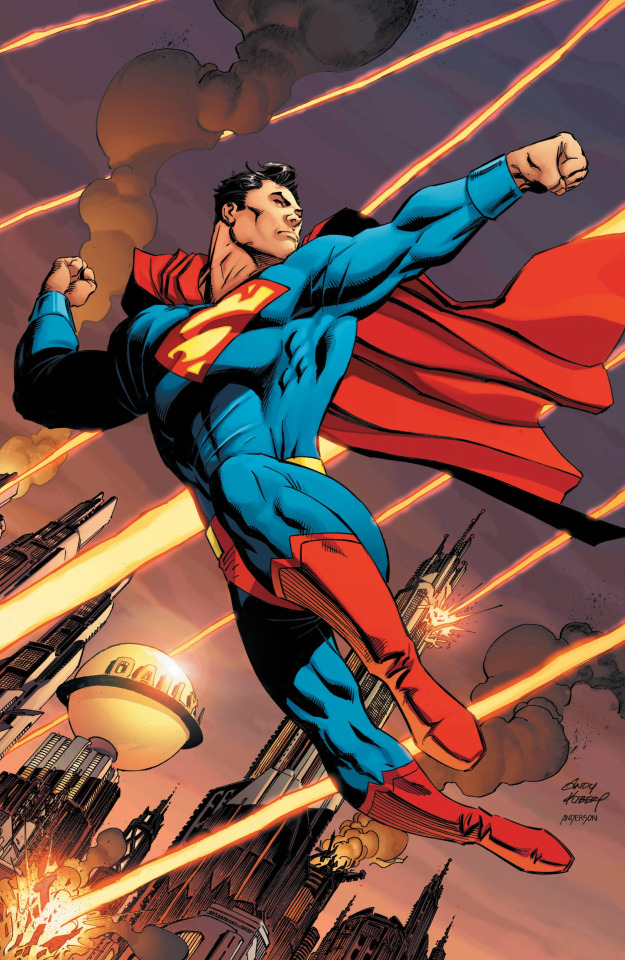
And here’s the other big “Superman’s just the best” comic the decade had to offer that actually pulled it off. Sadly if reasonably best-known for its one true misfire of a chapter, with the increasing antipathy towards Tom King among fans in general likely not helping, what ended up overlooked is that this is a stone-cold classic on moment of arrival. Andy Kubert turns in work that stands alongside the best of his career, Tom King’s style is honed to its cleanest edge by the 12-pager format and subject matter, and the quest they set their lead out on ends up a perfect vehicle to explore Superman’s drive to save others from a multitude of angles. I don’t know what its reputation will end up being in the long-term - I was struck how prosaic and subdued the back cover description was when I got this in hardcover, without any of the fanfare or critic quotes you’d expect from the writer of Mister Miracle and Vision tackling Superman - but while its one big problem prevents me from ranking it higher, this is going to remain an all-timer for me.
3. Jeff Loveness’s stories Help and Glasses

Cheating shamelessly here, but Jeff Loveness’s Help with David Williams and Glasses with Tom Grummett are absolutely two halves of the same coin, a pair of theses on Superman’s enduring relevance as a figure of hope and the core of Lois and Clark’s relationship that end up covering both sides of Superman the icon and Superman the guy. While basically illustrated essays, any sense of detached lecturing is utterly forbidden by the raw emotion on display here that instantly made them some of the most acclaimed Superman stories of the last several years; they’re basically guaranteed to remain in ‘best-of’ collections from now until the end of time.
2. Superman Smashes The Klan

A bitter race for the top spot, but #2 is no shame here; while not quite my favorite Superman story of the past ten years, it’s probably the most perfectly executed. While I don’t think anyone could have quite expected just *how* relevant this would be at the top of the decade, Gene Yang and Gurihiru put together an adventure in the best tradition of the Fleischer shorts and the occasional bystander-centered episodes of Batman: The Animated Series to explore racism’s both overt and subtle infections of society’s norms and institutions, the immigrant experience, and both of its leads’ senses of alienation and justice. Exciting, stirring, and insightful, it’s debuted to largely universal acknowledgement as being the best Superman story in years, and hopefully it’ll be continued to be marketed as such long-term.
1. Grant Morrison’s Action Comics
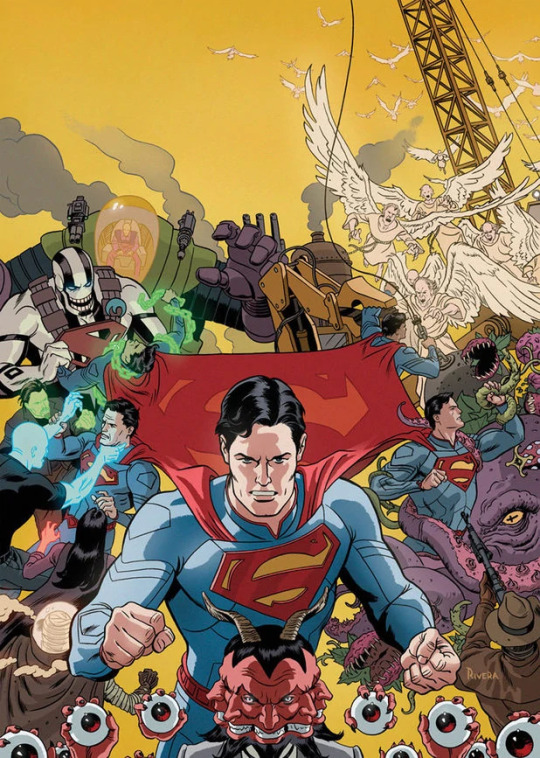
When it came time to make the hard choice, it came in no small part down to that I don’t think we would have ever seen a major Golden Age Superman revival project like Smashes The Klan in the first place if not for this. Even hampering by that godawful Jim Lee armor, inconsistent (if still generally very good) art, and a fandom that largely misunderstood it on arrival can’t detract from that this is Grant Morrison’s run on a Superman ongoing, a journey through Superman’s development as a character reframed as a coherent arc that takes him from Metropolis’s most beaten-down neighborhoods to the edge of the fifth dimension and the monstrous outermost limits of ‘Superman’ as a concept. It launched discussions of Superman as a corporate icon and his place relative to authority structures that have never entirely vanished, introduced multiple all-time great new villains, and made ‘t-shirt Superman’ a distinct era and mode of operation for the character that I’m skeptical will ever entirely go away. No other work on the character this decade had the bombast, scope, complexity, or ambition of this run, with few able to match its charm or heart. And once again, it was, cannot stress this enough, Grant Morrison on an ongoing Superman book.
86 notes
·
View notes
Text
tagged by @kissingagrumpygiant uwu
rules: choose your 5 favourite works you created in the past year (fics, art, edits, etc) and link them below to reflect on the amazing things you’ve brought into the world. tag as many writers/artists/etc as you want (fan or original) so we can spread the love and link each other to awesome works!
well, considering a lot of my work this past year was Original Content for School, it’s gonna be mostly original work lol
1. The Curse of Blackwood Castle

The Curse of Blackwood Castle was my most ambitious school project I made this year that I also made available on itch.io after school let out for the summer. It’s a 30,000 word game I made on Twine for a class on narrative in film and games.
Play as one of three original characters who run a popular Youtube show called Forever Ghostly, where they investigate paranormal locations while also providing an in depth history of the location.
This is the demo. It’s unfinished and will probably not be finished in this format, as I have plans to turn the concept into a Choice of Games with an MC, rather than with 3 player characters.
2. Tzedakah

Tzedakah was a short film I wrote last semester for the same class I made Blackwood Castle for, which tells the story of my OC Ilya’s mother, Rivkah, and how she came to adopt his youngest brother.
This one I was extra proud of because the professor said it was a great film and could really go places.
I also learned that I really really really like screenwriting and especially enjoy writing short films while working on this piece lol
3. Analysis Essays
Don’t know if this is like cheating or not but by the end of last semester I had gotten REALLY good at writing analysis papers and I’m kind of very proud of that. I got a lot of 80-90′s on my writing in 2020 and I’m really proud of that lol
4. FenHawke Fanfic WIP(s)
I’m currently working on an Ace!Fenris/Hawke fic that should be done relatively soon? I know it’s technically not posted yet, but I did post a WIP Wednesday sneak peek at it, and I am excited for it.
I’ve also got a longer, multichapter fic for them as well that I’m working on outlining right now!
5. Zevran/Warden Fanfic WIP
Currently being written, I’m very excited and proud of how the Amaranthine-era Dragon Age fic I’m writing is coming along lol.
snippet under the cut for length lol
The shores off the coast of Amaranthine are quite often blanketed by a thick ceiling of swirling, grey clouds. Though they are not exactly on the Storm Coast here, the overflow of rain and wind tends to batter the walls of the city more often than not.
Today is no different, as the wind howls around the battlements and over the rooftops, drenching their evergreen arling in even more life-giving rain.
Unfortunately, however, the rain is the only thing giving life today.
The stones beneath their feet are soaked with red, draining down the gutter and washing down towards the lower end of the city. It seems like so much blood, more than there’d been at the last scene, but maybe that’s just the effect of the rain. The guard has done a rather surprisingly good job of blocking off the crime scene, keeping the murmuring crowd of curious onlookers far enough back that Kira can’t hear any of the speculation over the roar of the rain. Even the crest of the Warden-Commander couldn’t keep the curious from pushing in too close without the guard’s presence. The guard had even managed to put up a tarp over the scene as best they could, to keep at least some of the evidence from washing away.
Even with the rain washing away the blood, though, the scene is still gruesome.
The corpse has been mutilated so badly that it’s hard to tell anything beyond the fact that it’s humanoid at best. Whoever had done this had obviously not wanted the victim identified any time soon, the body resembling a pile of meat more than a person. Even though she’d certainly seen much worse, it still has her stomach turning a little at the sight of it.
“Have we got any idea of who this is?” Kira asks, stepping towards where Nathaniel had been speaking in low, hushed tones with some of the guard who had been there when they arrived.
He shrugs at her as he turns to look back at the body. “Not yet. All we’ve got is that we think it might be one of the Alienage residents.”
“Strange,” Kira murmurs, watching her second-in-command step up to the body and bend down, examining the wounds. Surana’s face is hard as stone as she carefully prods at the victim with glove-covered hands.
“Do you think the murderer brought them to the upper market?” she continues at length, forcing herself to look away and at Nathaniel’s face instead. “Or were they in the wrong place at the wrong time?”
Nathaniel scoffs quietly, shrugging again. “Hard to tell without knowing who this was in the first place.”
Kira lets out a long, tired sigh at that, nodding as she crosses her arms and looks back over at the crime scene. “What can you tell from the body, Nadia?”
Surana’s face is grim, long dark hair sticking to her brown skin as she leans back on her haunches, wiping the rain from her eyes.
“Well,” she starts hesitantly, “at first glance, it looks like a botched attempt at blood magic. The cuts on the forearms and here on the neck suggest bloodletting, but - I don’t know. Something’s off.”
“No kidding,” Nathaniel mumbles. “Is it just me or are these bodies getting even more mutilated with each new victim?”
Both Kira and Nadia give a derisive snort, all of them staring blankly at the corpse. Nadia goes back to poking at the wounds with one of her knifes, carefully lifting bits of fabric and flesh to catalogue the state of the body. It’s hard to look at, even with everything they’d seen, and Kira finds herself looking back towards the crowd instead of at the body as the minutes pass.
Of all the things that had come with the territory of becoming the new arlessa of Amaranthine, somehow the talking darkspawn had been less of a surprise than this. Maybe it’s just because they’d been fighting the Blight for so long when the new darkspawn had shown up that it hadn’t been cause for any of them to even blink at it, but this new chain of murders is much more unsettling somehow. Darkspawn are darkspawn - they mutilate without reason because that’s what they are designed to do, and somehow that makes it easier to take in. Besides, during wartime, coming across bodies was somehow easier to compartmentalize, but this?
This is no darkspawn attack.
I’m also not tagging anyone bc I have no idea who has been posting things and who has not jfklds
#my writing#tagged for me#;w; ive grown a lot as a writer this year and im really excited for the WIPs i'm working on
27 notes
·
View notes
Text
What medium best expresses Sonic’s character?

Right, so this is a bit of a detour from the typical Hazbin Hotel posts I’ve been making, but I really did a heck-ton of work to come up with this. Then again, I type overly long paragraphs as a hobby, so jokes on anyone who thinks I don’t do this for fun... but then again... jokes on me for making the time to type Hamilton-esque essays on fictional characters ._.
Okay enough with tangents, this is an essay dedicated to answering what medium -- songs, scenes, cartoons, maybe even a comic issue -- best encompasses Sonic’s character. Take in mind, throughout the 29-almost-30 years of Sonic, there have been many iterations and takes on the character that either differentiate on a minor level, or to the point that some Sonics when compared seem to be starkly different characters altogether, so this is purely what I feel is the best take on Sonic’s character. For my sake, I’ve sworn off including material that require a long-winding read through some mediocre storylines -- nothing personal, Archie Comics. I won’t be covering Archie Comics because I’ve yet to finish reading all 200+ comic issues because that’s not humanly possible for me. If I ever manage to though, I might make a post about Archie Comics in some way. For now, here’s my personal essay on “What medium best expresses Sonic’s character”
Starting off with shows...
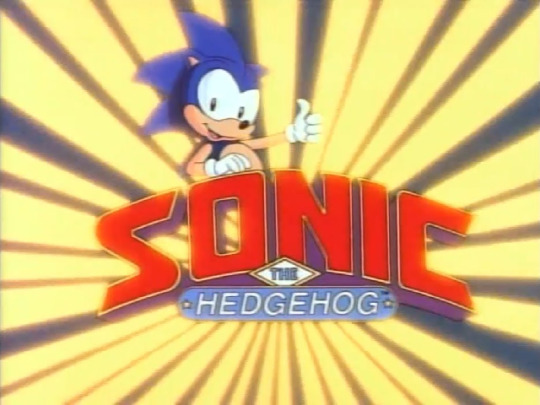
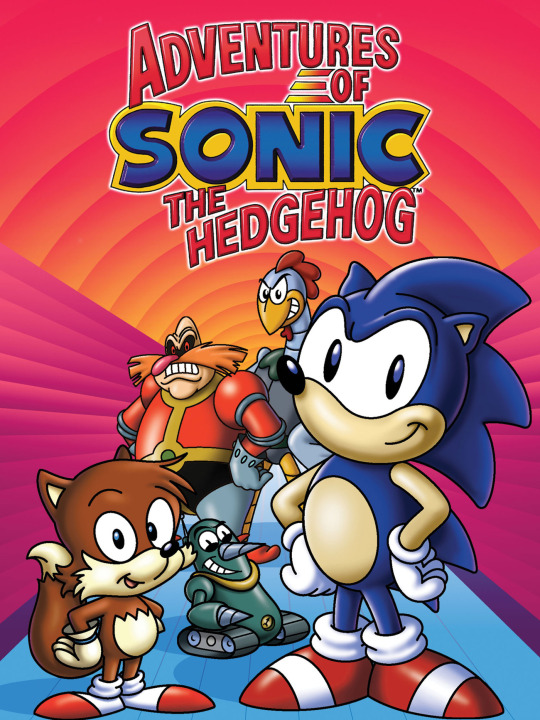
Sonic SatAM (1993) and Adventures of Sonic the Hedgehog (1993) are products of their time, and I never got to watch them when I was young, so I hold no sentimental nostalgia. Sonic SatAM seems in-line with Archie Comics, with the Freedom Fighters plotline and the infamous Sonic mohawk with lasted for a significant amount of issues. Adventures of Sonic the Hedgehog was pretty comical and lighthearted in comparison. Both were voiced by Jaleel White, had the same artstyle, and established Sonic’s character in vastly different tones. It’s rather outdated as Sonic has lived past the 90s for 20 years, where he got revised and reinvented to suit the decades. So both characterizations are simply inapplicable to Sonic’s character.

2003′s Sonic X worked off of the newly reinvented Sonic and paved way for Sonic’s personality for the following years, but I do have critique over the show, and their execution of Sonic’s character. Though they did provide Sonic's "constant desire to run", he lacked soul and the over-the- top nature of his character. Sonic throughout this show displayed a rather hollow connection with his relationships, was as distant and aloof as Knuckles for seemingly no reason, lacked much depth and barely developed, and was overall, very poor with communicating his thoughts and actions -- which ultimately led to a number of plot lines where his friends and/or authorities saw his intentions as malicious or even evil. Sonic is hyperactive and free-spirited -- something this show doesn't fail to display -- but Sonic lacked his heart. Where was that desire to hang out with his friends? Where was the underlying love and compassion he'd constantly display in and out of battle? Where were his cheesy yet well-meaning impromptu speeches? These aspects of Sonic were sorely lacking and missed when I watched through this series which is why I believe this anime didn’t really express Sonic's character.
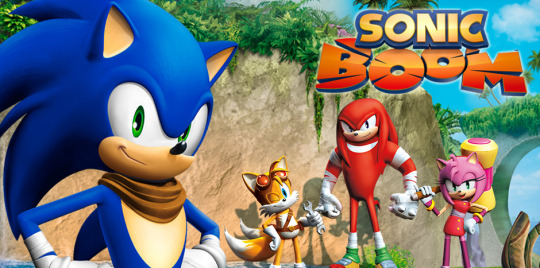
Sonic Boom...
...is a lighthearted, slapstick sitcom-based comedy. Very episodic, which is aight, but the the show’s execution as a whole was mediocre-borderline-bad. It doesn't have much elements inherently Sonic-esque -- it's a product of the Modern era, which at this point, doesn’t seem to have good connotations. No worthwhile soundtrack, stunted animation and movement, embarrassingly heavy reliance on overused archetypes/stereotypes at the expense of the characters, repetitive plots that get the THICC layer of frosted sarcasm and self-awareness. Sonic had attitude sure, there was a clear level of disinterest and cynicism to this portrayal -- it was as though protecting people felt like a burden and chore to him. It doesn’t help that this feeling is justified as Eggman’s been reduced to a pathetic Saturday Morning villain with lesser competency in being a world threat, and much rather a constant nuisance to Sonic’s town than anything else. Subjectively speaking, this show's clearly not for me -- even when I was in the supposed age range at the time. Objectively, this Saturday morning cartoon should've been branded as it is, rather than a Sonic cartoon because the identity of Sonic the Hedgehog definitely got skewed and misconstrued by the eyes of newcomers whose first exposure to Sonic the Hedgehog character was this. Ironically, due to this show, I subsequently furthered my distance from the franchise at that age, and got into it much, much later in life.
Now moving onto the songs...
Initially, I considered “Escape from the City”, “Live and Learn", "His World" and "Fist Bump" as good contenders in defining who Sonic is. But through some vigorous looping of those songs, I've pinpointed what they've to offer in showing Sonic's character, and due to my consistent nature of typing overly long arguments about anything I find interesting, I'll be putting each song into its own paragraph -- picking out any significant verses, and explaining why I think each song subconsciously contributed to my thought process that they would be the best take on his character. Afterwards, I’ll finish with my conclusion. (I personally suggest you go listen to each song as you read each paragraph)
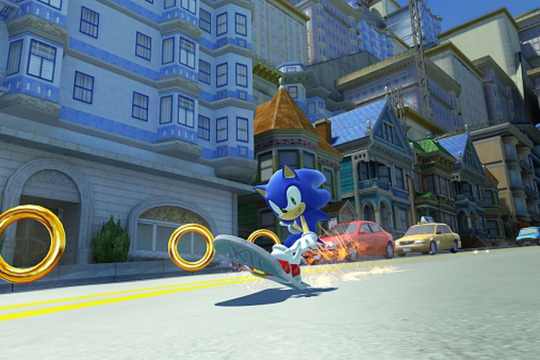
"Escape from the City" is a timeless bop, and I will play it in the car whenever I'm actively escaping from authorities in my city. What this song does is use rhythmic beats and repetitive bass line to emulate the constant adrenaline and excitement Sonic feels when he's moving around, it embodies his carefree nature and spontaneity to a T. It succeeds in portraying the energetic, upbeat aspect of his personality as the song itself contrasts the very dangerous implication of being chased down by the government for a crime you didn't commit. Sonic doesn't get enough credit for the amount of cheerful optimism he has -- always moving with a spring in his step, or steps considering the speed part. He brushes off the most life-threatening dangers he has to face and takes it all in with that well known Sonic™ grin. It also shares a constant message of "Live and Learn" (which the song of the same title) -- this is a rather succinct version of Sonic's mantra. The song is very Sonic, but only manages to show his surface level personality. Kinda like Sonic X's theme song "Gotta Go Fast" but it's much less in your face about Sonic's whole shtick. Another thing to note is the element of "escape" is a constant in both "Escape from the City" and "Endless Possibility", which I'll get further into later. Given that this song was more focused on the primary objective of ‘City Escape’ the game level rather than exploring Sonic’s fundamental character, it's very cool how it just so happened to tie in well with him...
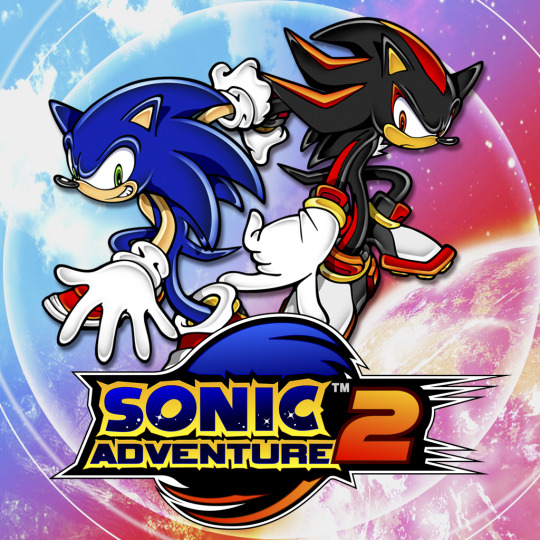
"Live and Learn" was more of a Sonic and Shadow song, so I already kinda figured it wouldn't manage to explore Sonic's character much. The first verse and chorus offers as much for Sonic's character as Shadow's oh-so few lines of verse 2 does. Again, the song only manages to provide Sonic's surface level personality. Reason it came up in my mind was because of the words 'Live and Learn'. It's a very motivational and inspiring line -- what got me thinking about Sonic’s character in the first place. It's an unspoken rule for him to take life headfirst and live in the moment, and legit the second issue of the IDW's comics reiterates this by Amy expressing that this free-spirited approach to life is what essentially makes her love him.
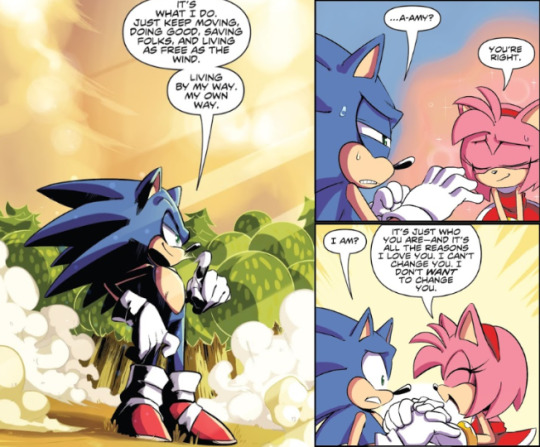
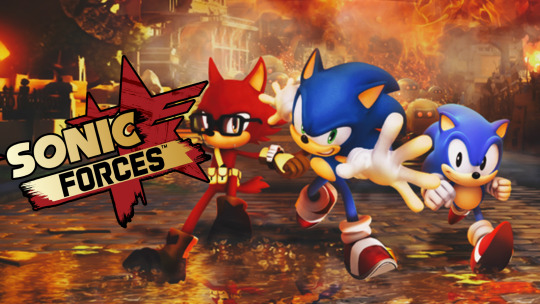
"Fist Bump" was like my first exposure to Sonic main theme songs -- and I'm still into listening to the song. I realize the lyrics are pretty generic, but it does reflect the general focus of Sonic character very well -- which may further explain why Modern Sonic is much less... developed, to say the least. What the lyrics essentially hone in on are Sonic's loyalty to his friends and his.... unyielding determination? Honestly, a very generic take for a main theme, and it reflects on the quality of the game if even the music lacked much personality compared to any heroic video game character theme song. Sonic had more personality to offer in his silent protagonist games, compared to this. This issue with Sonic's character barrels down to Modern Sonic retaining his previous counterpart's cheesy insistence to spout improvised speeches and embrace the power of friendship -- though it's definitely gotten out of hand in this case. We need balance.
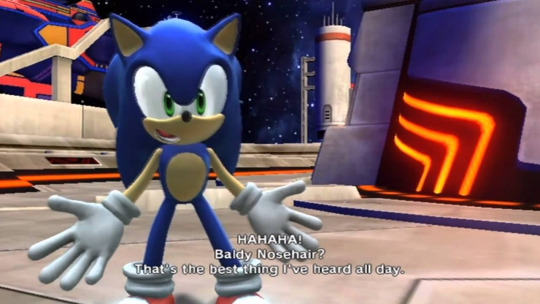
Making Sonic more family-friendly ≠ Dumbing down what nuance or individuality there was to his character and making him every other generic hero protagonist who quips for 90% of his dialogues.
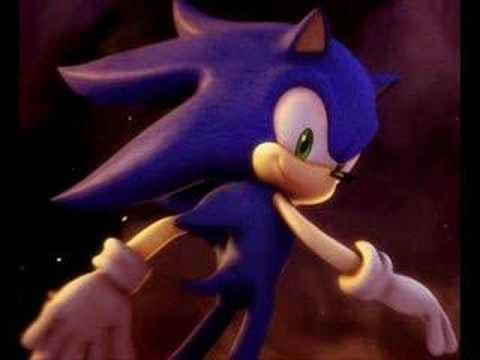
Finally, "His World", but I'll do Crush 40 and Zebrahead's separately, sort of. Crush 40 explicitly tells Sonic's character how it is -- his strict moral code, good intuition, confidence in himself, "seize the day" mentality, straightforward disposition, stubborn determination, love for his friends, and fearless risk-taking -- it's pretty lengthy but it does a good job as Sonic's theme and manages to state what it's like in his world. However, the song faces eerily similar issues to "Fist Bump" with it's lack of creative interpretation with its lyrics, and compared to "Escape from the City", it seems more formal and serious in tone which is reflective of their portrayal of Sonic.
I interpret Sonic as a multifaceted character, but when listing out all those traits in the verses and chorus in the song’s tone and format melody-and-lyric-wise, the song makes it appear as though Sonic is strictly a pillar of justice and represents the strong, untouchable hero persona -- which I find to be a detrimental writing aspect for his character. It writes off his personality as second priority to the reputation that would have receded him through the years of defeating Eggman and saving the world -- and subsequently, paints his character in a rather dulled and overly no-nonsense light. Not saying I don't want Sonic to be serious at certain points, but I think with this song, and this game as a whole, there was some truth to the issue of Sonic '06 being a little too serious. While these characters were well-written in this game e̶x̶c̶e̶p̶t̶ ̶t̶h̶e̶ ̶t̶h̶i̶r̶d̶ ̶p̶o̶i̶n̶t, I've had personal issues tied to em:
Shadow coming back was quite risky and foolhardy for his character journey and I believe if it weren't for the great execution for his storyline in '06, his appearance would've been viewed as fanservice -- which is what he's sadly been reduced to now
Silver's character concept as a whole was pretty dark and serious, which again isn’t a bad thing, but with the plot resulting in him seeing Sonic as the Iblis Trigger, it limited Sonic's ability to play up his easy-going, carefree nature since he couldn’t just brush off that accusation with offhanded remarks as that would’ve risked Sonic coming off as insensitive and unsympathetic at that moment. Which is not what the writers want their characters to go.
Elise. There, I said it.
On top of it all, "His World" is pretty slow-going for Sonic’s theme, which I could try justifying by saying it might’ve been a representation of significant growth to Sonic's character -- perhaps the journey managed to shape him into a man (hedgehog) who could spare a bit of time to contemplate his next course of action -- as this game definitely explored a major deviation from typical Sonic game story lines. But, even with that, I still really prefer Zebrahead's version.
Zebrahead's is vastly the same when telling Sonic's character how it is, but the instrumentals, pacing and speed is increased significantly that it definitely sounds more reminiscent of Sonic's musical style -- fast-paced rock and roll. But, I’ve yet to figure out the significance of the lyrics:

Especially when it follows right after "Never fear the fall" -- so you take the leap of faith, but also don't let yourself fall in the process? Pretty weird flow of words there, but maybe I’m just not getting it at all. Point is, what both songs hone in on is Sonic's intuitive sense of justice and a bit of his carefree nature -- since the lyrics from Zebrahead's specifically highlight on Sonic's "leap before looking" nature. What Zebrahead further hones in on is his adventurous and hyperactive qualities as verse 1 and the bridge show. It's a timeless song of anticipation and build-up with good execution, but it doesn't cover the main essentials in what makes Sonic Sonic.
Finally, reaching the song I've found best covers the basics and essentials to Sonic's character is...

Believe it or not, “Gotta go fast” encompasses the defining characteristics of a well-written Sonic -- the title itself is a testament to the his motto and is all things Sonic stands for.

While this refers directly to the plot of the show itself, it manages to familiarize us with the speed and urgency crucial to Sonic’s character and--

Okay, clown time’s over, here’s the real winner.
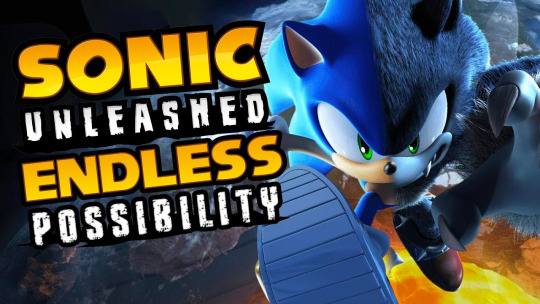
Unleashed's main theme: "Endless Possibility"
From the get-go, intro already separates itself from the other songs by being freeing and exciting, without being too carefree like "Escape from the City", too orchestral or urgent like "His World", and definitely more compelling lyric-wise compared to "Fist Bump". This tone is a constant throughout the song, and makes it seem like Sonic's the one directly singing -- the singer nailed it with the level of obnoxious and genuine tone to his voice.
This song, like the rest of the other main themes, reflect the game itself. Unleashed is a race against time for Sonic to fight Dark Gaia before the Earth gets torn apart. But similar to the gameplay and form of story, the music is very fast-paced yet unburdening, with hints of inner contemplation, and darkness (or how I like to put it, edge). The first verse already succeeds in getting into the bare bones of Sonic's character -- he runs, he can never stay still out because he knows that's not who he is, he's free-spirited and will run around the world out of his own volition, it's a form of escape and liberty to him -- and this is what ties into "Escape from the City”. This verse sums up the essential traits to Sonic better than any of the previous songs without letting one attribute overpower it. It refers to his three fundamental traits: that he's fast, adventurous and carefree.
The pre-chorus further expands from verse 1's establishments, by showing the deeper, inner turmoil that pass through Sonic's mind -- “How will I know when I get there? And how will I know when to leave?” -- these are the rare instances where Sonic is found in inner conflict with himself which came out of his simplistic philosophy rather than an external conflict or influence, and it's more of unspoken and nuanced as Sonic never usually calls himself into question for the way he lives. This showcases that he's capable of processing the long-term effects of living and moving around aimlessly -- constant adventure and freedom might eventually feel mundane, so he might eventually find the destination his heart feels is right for him, so what will he do when that period of his life unfolds, and will this period end the days of adventure and freedom? The possibilities are never-ending, so as always, he'll take everything in stride, and prepare for whatever hits him.
This is what the song's main theme is. Endless possibility. Potential and growth -- which reflects back to Sonic: mentally, physically and emotionally. Mentally, he's acknowledged that he's always growing and developing throughout his adventures -- as there's one thing that no one, not even Sonic can outrun, and that's change. "Endless Possibility" opens us up to the concept of ever-changing development for Sonic, and the possibility that he might eventually reach his unknown destination and end this long-running journey, while also implying that every journey that he goes through and ends -- whether it directly ties into the games or off-screen adventures -- will always lead with a new one. Unleashed encompasses this youthful feeling of change and vigor. Sonic is in his element and is going through a personal journey to save the world once again, but as always, he'll do it with enthusiasm and unbridled drive.
Interestingly, Unleashed feels reminiscent of Sonic X's Sonic but done right. Both have the character mostly isolated from his friends for the majority of their respective stories, but where Sonic X forces Sonic to clean up on Isle Eggbot each episode, Unleashed puts him through a singular adventure that requires he takes care of the major issue at stake while the others are doing their respective jobs or living their own lives. Unleashed's Sonic even has a temporary companion which he clearly warms up to and befriends throughout the whole journey, whereas Sonic X shows Sonic actively dismissing his previous friends to sleep, travel, and adventure for the heck of it -- while they spent a majority of the first season trying to find the chaos emeralds without him.
Sonic being isolated is usually due to situational happenstance rather than conscious preference. Sonic isn't inherently solitary or aloof, it's just due to his ability to move from place to place with ease that he subsequently has to leave his friends behind to confront the source of the problem. It's not a part of his character that he plays lone wolf like those archetypal "cool characters", the nature of what he does and excels at leads him to fight front and center, even if it means doing it alone. Despite this, he still is the sentimental, over-the-top dork that believes in the power of friendship and will go to the ends of the Earth to protect his friends. Which is exactly what he does in Unleashed.
The bridge provides the hints of edge where Eggman and Sonic exchange dialogue in the song, very much referring to the events of Unleashed's intro battle between the two. Eggman essentially tells Sonic to give up as he's actually beaten him -- which Sonic replies that it's not over, that this is just another start to another journey. The lyrics aren't very subtle about what they're saying, but it does a good job in encompassing two key traits when Sonic responds to any threats -- his cheerful optimism and unyielding determination. He doesn't respond to danger with simply quips, he responds to it with a campy but genuine declaration of strength and courage. The cheesiness in his words are very prominent, but he says them with a straight face like he's announcing his battle cry and promise to do what it takes to save the world and protect the ones he love.
In short, "Endless Possibilty" manages to fully encompass the best iteration of Sonic, and humanizes him to the point that I can only really see this as the current best sum up of his character without any needed dialogue, animation, or prior context. This song could just be tied directly to Sonic's overall character outside of the game's plot, and I'd be fine.
#my posts#sonic the hedgehog#sonic#sonic character essay#my character essays#small spoilers for idw#another session of overly long essays from yours truly
18 notes
·
View notes
Text
What School Is Like During the Covid19 Pandemic
Diego Padilla
For a large majority of students (like myself), the Covid19 pandemic has been an experience unlike any other. Policies such as stay at home orders, mask wearing, and other infection prevention guidelines haven’t been prevalent since the Spanish Flu of 1918, which few are around to remember. One of the biggest changes however, has been the transition from in-person learning to distance learning, which essentially means that most schools have gone online. This has also effectively eliminated any large school events, such as sports games, in-person standardized testing, club/academic team meetings, and much more. Even though many students find that online school has left them with a lot of extra time, I’ve noticed that it pales in comparison to the quality of education that physical classes have to offer, and heavily limits students.
It’s Now Much Harder to Communicate With Teachers
During the final three months of my last school year, it became clear to me that moving learning online created an overall loss of communication between students and teachers, especially during the transitional period. The initial assignments were sometimes confusing to follow, and the lack of physical interaction between us and some of our teachers made completing them a very irritating process. Additionally, I found that for some of my classes, I would often have no idea when things were due, at least not until the third or fourth week of online school (which at this point, our school had assigned us an online schedule that gave us check in periods for our classes). This new restriction not only put us students in a frustrating position however, but also our teachers. The increase in emails by us students made responses by teachers much slower, which resulted in grade fixes and incorrect scores on tests much more stressful to get fixed.
AP Test Prep Became More Difficult, Despite the Tests Becoming Easier
For many AP students, this testing season was very stressful, not only because of distance learning, but also due to the complete transformation of the exams. Now that AP exams had to be online, the College Board had shortened and drastically cut many parts of the exam, meaning the time spent studying for these portions of the course was essentially wasted. Though the topics on the exams were limited to only first semester course material, the new short length of the exam, coupled with the fact that there would be multiple different exams per AP course, made it impossible to pinpoint what subjects would be the most important to the test. Case in point, for AP U.S. History students like myself, this meant that the one essay that decided our score could be based on an important topic or event anywhere in the span of 200 years. And while the shortened versions of the exams were easier in many ways, it was still stressful to study for, especially knowing that your lack of in-depth knowledge in a single topic could potentially be the difference between a high and a low score (It is worth noting however, that this will likely be a different experience for incoming AP students, now that College Board has the data and feedback from the first round of online exams that they need to improve their testing).
The Lack of Physical Social Interaction Made Classes Less Enjoyable
I never truly realized how important social interaction was to making class more enjoyable until the Covid19 pandemic. In this new era of online school, the classes feel more like audio books, and the lack of interaction between students and teachers was very apparent, especially because most students choose to keep their webcams off. This made lectures more boring, and harder to listen to than the in-person classes that we used to have. Learning with these new barriers wasn’t impossible by any means, but much less appealing to the average student, especially considering the fact with every computer, distractions are readily available. It also didn’t feel the same to go to “school” without really ever talking to your classmates, which was never possible considering that teachers would keep students muted for a large part of class (to reduce distractions). The teachers that did encourage interaction between students, however, were often met with silence by most of the class, and only the normally outspoken students would speak up. Despite all of these negative changes however, there were some benefits that made online school more manageable, and less unbearable.
More Free Time
At my school, because teachers could not be expected to keep students online for multiple hours, the class times were much shorter. Our normal class time, which was an hour per period, was now reduced to 20-40 minutes per class, at only three classes per day (and for the students taking more niche classes like computer science or art courses, some days there were no classes at all). This gave us much more time to complete our work and study for exams, making it easier to get better grades overall. In addition to this, busy work became less impactful on our grades, as we had the time to complete it now. Overall, it felt more free despite being an inferior experience to in-person classes, and even gave me the opportunity to introduce exercise into my lifestyle.
School Work Was Easier (though less impactful)
The advent of online school limited the possibilities of long term projects and presentations to an essay format, meaning that the most work we could have at any given moment for any class was just an essay. There were still confusing assignments, but we had more time to polish them and make sure we were doing them correctly, considering that class took less time and that their difficulty was limited by the constraints of video calls and online work. Finals week was much easier than a normal school year as well, because our normal 2-hour final exams were now shortened to a small assignment or a 20 minute quiz. This did have some negatives, however. Easier work meant that half of our second semester’s worth of work didn’t really impact our grades. For some students, distance learning meant that there was little opportunity to raise their grades. This work also felt more like busy work, and didn’t really help students grasp the subject as much as our normal work.
Going through the experience of Online School was indeed unlike any type of schooling I had experienced before. While it did have positives on my free time and my stress levels, I ultimately feel that I was robbed of the school year that I now yearn to have had (though I can’t imagine what it must have been like to be a senior and miss out on a live graduation). It’s the school-wide events that you experience with your friends, the joy of interacting with them, and the ability to easily communicate with your teachers that makes school a better experience, and without all of this, it’s a less fulfilling journey, that many of us had taken for granted. We at the YUNiversity hope that this piece made some of you realize how different our new normal is (that is if you haven't already), and how important it is that we try and stop the spread of this virus. Stay Safe, and please remember to follow your county’s safety guidelines to prevent contracting the coronavirus.
The YUNiversity Interns | YUNiversity Writing Dept. | YUNiversity Art Dept.
#coronavirus#high school#online school#YUNiversity Interns#yuniversity#COVID19#pandemic#school#teens#writing#interns
3 notes
·
View notes
Text
First Draft Clean-Up Process: The Plot Paper
Hello, hello! I thought I’d drop in to share how I finish a first draft.
That’s right, I said finish.
This is always my second to last step. It comes after writing most or all of the thing, rainbowing the story, and considering what I need to change and adjust now that I know the scope of the narrative. I call this step the
Plot Re-Order
I use it to make sure the story is going in the direction I need it to, and to make sure all of the information is being given/released at the proper times for the reader to understand everything.
What I do:
Get a blank piece of paper (or a large mirror/white board and some expo markers)
Read the story and mentally take notes of where the information is out of order (write them down if you need to, but make sure you have a clean writing surface left over!)
Go through the story again and write down the plot you want the story to have on that nifty piece of paper.
This way, you’ll be able to see the narrative and character arcs more clearly.
Go back through the story and shuffle things around until you’re satisfied, referencing the Plot Paper. (I stick mine on the wall next to my laptop.)
Rejoice, for thy plot is now clean(er)!
It’s kind of like an essay outline, but completely backwards.
I find this to be super helpful, especially since I tend to get my different drafts mixed up in my head. Having two different things in front of me on two different mediums helps me keep track of what I’m doing vs what I should be doing.
This can also be helpful if you get stuck or lost while you’re drafting.
More about my own process under the cut, including pictures and more in-depth explanations!
Here’s what the process looks like for me (though less blurry, of course):

[Check out the post I made on rainbowing if you wanna know what the colors mean! I added red, which I use to title scenes and mark narrative breaks and shifts.]
This is a super duper zoomed out version of half of my rainbowed first editing draft (it looks super weird like this, I don’t like it). I’ve already started shuffling here, which is why the pink is so spread out. It used to be all clumped up at the top, which is where I had a big ‘ole infodump. Ew.
To fix that, I used my Plot Paper to see where I talked about things that could easily segway into exposition.
Said Plot Paper(s) and my bad handwriting:


I have a lot of scenes for a short story, eh? #fantasy
Beside each scene “title,” I write:
What I did in the scene
Describe, reference, explain, mention, etc.
Sometimes reasons for what I did if I think I need a reminder for later (I usually do)
What happens in the scene
The literal plot, character introductions, setting changes, important information drops
What my characters did in the scene
In terms of development, like how they’re feeling, mostly, and how that changes.
Sometimes I mention motivations and reasons for actions as they change
Time Shifts
When each scene takes place in the timeline and for how long
I also take notes on the sides and in any blank space I can find when an idea strikes me, I need to re-think some formatting, I should keep track of something in my next draft/read through, or a tiny adjustment should be considered.
Once I have everything sorted out, I go through my draft and make adjustments.
Ta-dah!
That’s it!
Questions? Ask ‘em! Comments? Make ‘em!
For more writing advice and observations, check out my advice tag.
Want some original writing? Here you go!
If you like my advicey ramblings and they’re helping you out, consider buying me a Ko-Fi!
#writeblr#amwriting#writing advice#advice#writing tips#writers on tumblr#writers of tumblr#writblr#writing#writer#writers#appendix#my writing process#my process#Plot Paper#editing#first draft#first drafts#my writing#rainbowing#editing draft#about me#plotting#story development#build a story#exposition#information release
210 notes
·
View notes
Text
tips on how to write when you just can’t
(personal advice. might work for you, might not)
you have an idea for your story but can’t get it out. or you know what’s going to happen but it’s boring and you’re starting to hate your work. the words are not appearing on the page no matter how hard you stare at it.
writing is writing, but telling a story doesn’t have to be solely writing words onto a page. it might come to that eventually if you’re set on your story being a novel, but it doesn’t have to start that way. I don’t think people realise just how abstract and crazy first drafts can be.
here’s some ways you can tell a story without writing:
record your voice and narrate verbally. there’ll be a lot of um’s and pauses where you don’t know what to say and it won’t be nearly as prosey as it is in writing. for me, I definitely prefer writing to speaking because I can edit what I write and think about what I write. but by verbally narrating you can get thoughts out quicker. you’re allowed to say one thing, then include a verbal note where you wonder aloud “that part might be better later on” and just continue. then, you transcribe it. and voila you have words!
it definitely doesn’t have to be a direct transcription. if anything, you can and should rewrite the parts you want to change. with this it’s like getting two drafts for the effort of one. this can also help to give your characters more distinctive voices as you’ll speak as they would (to make it easier to tell who’s talking when you record lol)
record your voice as you give a presentation about your story/chapter. this one’s good for developing stuff, and by developing it you generate new ideas. you analyse your characters, the metaphors, foreshadowings, reasons for actions, and double meanings. you go crazy over your story and fall in love with it again. similar to those comic sans presentation images you see on writeblr, but more in depth.
to use Romeo and Juliet as an example: “Who is responsible for Mercutio’s death? What is the role of destiny in the play? Why is Juliet the most tragic character in the play?” have a look at essay ideas and use them for your story. and when you talk as if you’re in front of an audience, you include the stuff you think they’ll want to know, which translates into what the readers want to know when you transcribe the juicy parts into your writing!
another verbal format can be a DND campaign with you as every character and the DM (feel free to use a die!) it might not work so well for romance novels but do what you want! have fun getting a crit 1 on smooching, baby!!
record the audio/video as you play with toys or objects that represent your characters I feel like this one is good if you lose track of who’s in the scene, because you can physically see who’s there. even if you aren’t writing a kid’s book, you’ll be brought back to the days when you played pretend, and stories and fictional worlds were fun and not stressful to fill with societies and environments. novels have this odd reputation for being grandoise and writers automatically assume your book’s got to be the BEST thing the world has seen. it’s not that deep bro. anybody of any age and background can tell a captivating story.
you can draw instead of writing. or you can write AND draw, where you sketch something you don’t know or can’t be bothered to describe. and if this goes well for you, you might want to consider making a comic or graphic novel instead. or do it on your phone using goddamn emoji’s. who gives a fuck.
on a different note, if you’re someone who mainly struggles with ideas, you need to look at your story like an alien. question and doubt the mundane, what’s considered normal. this will probably include research.
to use an example, in my most recent chapter I had a character who was riding a horse into town. sounds simple right? let’s quesion that: how was he riding the horse? you might think, oh well, it’s just a horse, you ride on it’s back. but there are names for the way you ride. (everything has names and labels, idk why.) and it turns out he was riding bareback, as the horse was wild and had no saddle. and so what I did was look up bareback riding, paraphrased the definition into my story to explain to the reader what my mc was doing. “Bareback riding is a form of horseback riding without a saddle. It requires skill, balance, and coordination, as the rider does not have any equipment to compensate for errors of balance or skill.”
hey look at that! those are words you can include in your story! it’s a form of description! another question: does my character have the skill required? no. and immediately that creates a story. how will this inexperienced rider ride this horse? readers love characters who can’t do what they’re trying to do but who do it anyway.
question the weather. temperature. the location. mythical creatures. superpowers. science. furniture. rethink everything you think you know. brainstorm or play word association games.
to use a more general/random example: your character is hungry. questions: what food? where will they go to get food? why that place? how will they get to the place and what could stop them? will they go with someone? will they not get food despite their hunger, and what’s the reason for that?
everyone will answer those questions differently: and that’s why every story is unique no matter how simple and cliche the premise is.
there’s also the advice to “write badly” and I don’t think people often understand what that means. it doesn’t always mean telling a shitty story, though you absolutely can if you want to. it means you have full permission to abandon grammar, spelling, punctuation, and coherency. include cliches and ignore every piece of writing advice you’ve ever heard! you can tell the story instead of showing bc at this point you just need words. example, a very butchered version of the passage “it was a dark and stormy night”:
It was dark outside somewhere idk. In a house (bedroom maybe?) some lady, wraped in a blanket (or quilt?) sat on her bedd and wotched trees moving in the wind and behind the tres clouds moved fast all spooky like.
a useful tool which squeezes words out is laying down the 5 questions: who, what, when, how, where. mike ran at noon quickly in the gym. and just repeating that structure over and over, omitting certain questions when necessary.
it’s going to suck and you’ll hate it: but you weren’t happy with/able to do a more polished version, so does it matter? the words are there. it counts.
use generators for names and descriptions, you don’t have to come up with everything but you make it look like you did.
steal your favourite lines from ALL your favourite idols and remix them. no-one will care if they can’t tell who you took it from.
if all else fails: get a ghostwriter
#writeblr#writing#writing advice#original writing#original fiction#creative writing#wip#nanowrimo#fanfic#fanfiction#long post#the plant speaks
11 notes
·
View notes
Text
let’s discuss how Sly 3’s lack of “typical” levels damages its potential as a game
both Sly 1 and Sly 2 have a set of levels which can fit into specific categories:
Raleigh and Dimitri’s levels can be seen as the tutorial level, with blue as a major colour in their palettes welcoming the player (Raleigh’s episode can also be seen as the ‘sea level’)
Muggshot has the ‘desert level’
Miz Ruby shares her style with both Rajan and the Contessa, as the latter two split Miz Ruby’s spookiness and jungle setting. we therefore have the ‘spooky levels’ and the ‘jungle levels’
Panda King and Jean Bison have the ‘snow levels’
Clockwerk and Arpeggio/ClockLa have the final levels, which can both be linked by their mechanical themes
to any player, this is all very reminiscent of other games (off the top of my head: Mario Kart, Conker’s Bad Fur Day, Uncharted, Pokémon, etc.). i’m not saying a game has to categorise its levels in this way to be good. not wanting to fit into these stereotype boxes is ok! this format feels tired nowadays anyway.
Sly 3 was ambitious, surely. what we got was:
Venice instead of Paris (the latter being a tutorial in the first game, a level in the second game, and a theme in both games as well as in the lore). this could be seen as the equivalent of the ‘tutorial level’ (Raleigh, Dimitri). this was a cool hub: it had moving gondolas, Carmelita was roaming the area, the main buildings of interest were unique (Police HQ, Octavio Clock Tower, Opera House, Ferris Wheel, Plaza)
Australian Outback as a ‘wild level’ (?) if that even makes sense. this was a misstep: red rocks and mountains did not make up for lack of buildings. the hub felt redundant, the crane in the centre had limited use, the details were scarce. the main concept here was like Nature V Artifice, but i can’t imagine a player ever thinking ‘gee, i wish i had a construction-themed level’
Holland had Carmelita... i guess? she wasn’t even there permanently. whereas with the other Sly 3 levels i can squeeze out an excuse for a theme, Holland as a hub doesn’t have anything unique. the windmills ok. what then? the wolf? hm maybe ok. the castle? the same castle we didn’t get an interior for. no ma’am. absolutely f not. the blimps were a nice touch, but other than that, it was a depressing hub. the only thing i absolutely loved about this episode was the hotel. it didn’t have much going for it, but this was the first and only time we met actual, innocent civilians in a playable hub. think about that. the mission where Murray rows Sly to the rooms via sewer is one of my highlights from the game
China was the exception. i talk about it in more depth in my Tsao essay (https://inspector-montoya-fox.tumblr.com/post/188231490502/hi-heres-a-personal-opinion-tsao-is-an) but basically the hub was vast with lots of great details such as the pagodas, the Chinese boats and Carmelita (ofc), the other locations were fun as well (Panda King’s retreat, Tsao’s bamboo spot, the palace’s interior, the treasury). it also happened to fit the ‘snow level’ slot
Bloodbath Bay was the ‘sea level’... supposedly. overshadowed by that godforsaken pirate ship map gameplay, there wasn’t much to discover. the guards were great, the rocking pirate ships were nice. what about Skull Keep? why wasn’t there a mission exploring the interior? Sly 2 relied heavily on interiors (Contessa’s various spooky rooms, Rajan’s spice operation lab, Rajan’s ballroom, Rajan’s guesthouse, the lighthouse, Dimitri’s nightclub), why didn’t Sly 3 continue with that formula? didn’t SP consider that the players would be curious to find out how the Keep looks like inside instead of bashing the same palm trees again and again? but credit be given where credit be due: although empty, the prehistoric lizard island was an ok hub
I cannot stress how much of a disappointment Kaine Island was. SP went ahead and designed the ULTIMATE ‘final level’. it was ALL the evil lairs combined into one: laser sharks, laser bats, mindless minions, a huge Frankenstein’s monster turtle thing, all on a mountain surrounded by watch towers and sunk in an acid tub. and what did we get? well, not a playable hub to begin with. we got unconnected missions all glued together hastily, each one being even worse than the other (cottdamn diving gameplay, plane and RC car gameplay... ffs). and then the Cooper Vault... it wasn’t bad. it just wasn’t great. it wasn’t worth the hype Sly built over the course of the recruiting procedure. looking at the ancestors’ stuff and going through all the traps they set was fun. that being said, too many unanswered questions were created. what about the other ancestors? where was Sly supposed to build his own section if the Vault ended at Connor’s section? did everything get destroyed when the island collapsed? basically, not worth the headache...
Australian Outback, Holland and Bloodbath Bay: what these three levels had in common was their lack of character. as Sly players, whenever we hear ‘Prague’ or ‘India’ or ‘Haiti’, the levels from Sly 1 and 2 instantly pop up in our mind. the episodes left such a mark in our brains that we will always associate them with their real counterpart locations. they had detail: cobweb fences, satanic goat skulls, dead turtles, little French cars parked in the streets, a fucking lighthouse maybe idk??? and most importantly: they had groundbreaking music. i’m not saying Sly 3 didn’t have these things. but in comparison to Sly 1 and 2, Sly 3 didn’t have shit.
to get back to where i started: a game’s levels don’t have to fit under the stereotypical categories - but it helps. because when you have a specific theme or characteristic in mind it helps to build upon that. like use the spookiness, the snow, the lava, the sea as a foundation and then build up amazing structures, designs, characters. i’m not a game developer but i feel like i’m making sense. if a game level doesn’t follow these (today considered) clichés, then it has to stand out because of something unique. Arkham City didn’t have a theme. it was just a dark abandoned section of Gotham. but Rocksteady sprinkled so many details and easter eggs across it that i spent hours just flying around (i know i’m comparing Arkham City and Sly Cooper, shut the fuck up). see my point?
13 notes
·
View notes
Text
My Oxford Finals Papers
Hello! Here’s a much requested run-down of the papers I took for my finals! There are 2 streams you can choose between after your first year of Oxford English - Course 1 and Course 2. I went for Course 2 - chosen far less than Course 1 but I found it to be incredibly rewarding!
Paper 1 - Literature in English, 650-1100 (Old English)
- Exam in Trinity Term (3rd and final term), 3rd year, 3 essays in 3 hours
- College taught in Michaelmas Term (1st term) of 2nd year and then revisited for revision
- Focus: Cynewulf's runic signatures concluding his female saints' lives (Juliana and Elene), Ælfric's Catholic Homilies (particular focus on his life of Cuthbert), Old English metrical charms (particularly those found in the margins of MS CCCC 41)
- I LOVE OLD ENGLISH!!!! That is all I have to say about this one, I looooove it
Paper 2 - Medieval English and Related Literatures, 1066-1550 (Romance)
- Exam in Trinity Term, 3rd year, 2 essays in 3 hours
- Faculty taught in Hilary term (2nd term), 2nd year, and then revisited for revision
- Focus: Magic and the supernatural in the First Branch of the Mabinogi (medieval welsh), Marie de France's Lais (particularly Lanval and Milun; medieval French) and Walter Map's King Herla (Latin); The flexibility of the Middle English Sir Gowther in its varying manuscript contexts
- This paper was a challenge because it’s completely unlike anything I’ve done before. Because it was 2 essays in 3 hours (rather than the usual 3), topics had to be much broader and explored in greater depth. You’re also handling different languages too (although you can work with them in translation, but that does make the way you approach analysis different to the way it would be approached if you’re working with the original) and it’s a genre (rather than time period) paper. This is one of the reasons that I really liked Course 2 - while with Course 1 all the papers are time period ones, Course 2 spices things up a bit and I think that enables you to develop a broader skillset.
Paper 3 - Literature in English, 1350-1550 (Middle English)
- Exam in Trinity Term, 3rd year, 2 essays and 1 commentary in 3 hours
- College taught in Michaelmas and Hilary Term, 2nd year and then revisited for revision
- Focus: Authority and translation in Robert Henryson's Morall Fabillis, Gavin Douglas' Eneados and David Lindsay's 'The Testament and Complaynt of Our Soverane Lordis Papyngo'; Affective piety in Middle English Marian lyrics and related material culture; Set commentary passage from Chaucer's ‘Troilus and Criseyde’
- The topics I explored for this paper were really interesting - I thoroughly enjoyed it. I messed up my timing in the exam but hey ho, these things happen!
Paper 4 - The History of the English Language to c1800
- Coursework, submitted Trinity Term, 2nd year
- An essay and a commentary, both 2000-2500
- Formatted like a 'take-home exam' - questions are released and you choose 2 and have about 2.5 weeks to write and submit
- Faculty taught in Hilary and Trinity Term, 2nd year
- Chosen Questions:
Essay - In historical research, there are no 'bad documents' (HIPPOLYTE TAINE). Discuss.
Commentary - 'Nothing reveals the deficiencies of a language more surely than translating into it' (CHRISTIAN KAY). Provide a close analysis of the language of TWO texts which seem to you to reveal or contest that claim.
- Similar to the Romance paper, this one was unlike anything I’ve done before! It was a bloody challenge at first because of it being such an enormous leap up, especially having never done any linguistics before. In the end though, I loved it and I explored some really interesting topics!
Paper 5 - The Material Text
- Coursework, submitted Hilary Term, 3rd year
- A commentary and an essay, both 2000-2500 words
- Formatted in the same way as the English Language paper, but they're considering changing this to be more like your standard coursework
- Faculty taught in Trinity Term, 2nd year, and Michaelmas Term, 3rd year
- Chosen commentary folio:
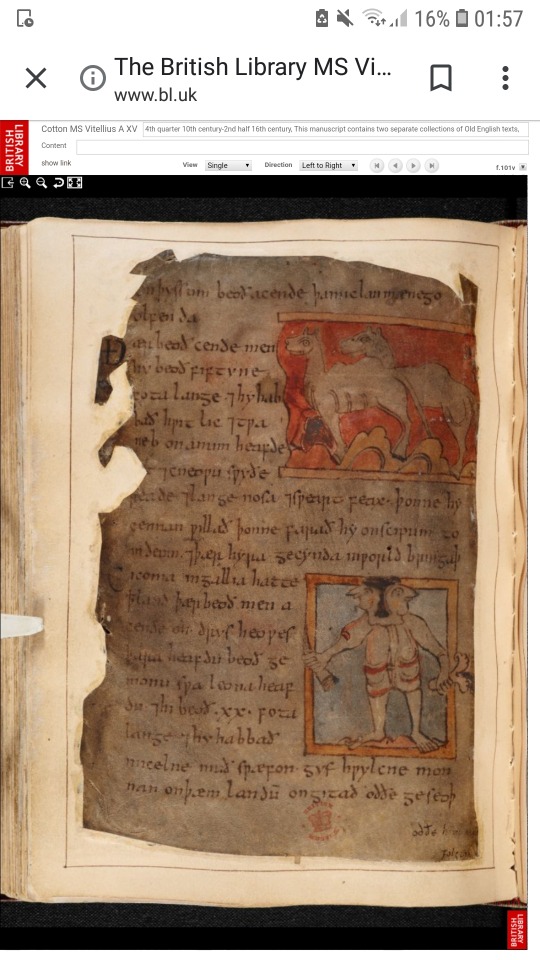
- Chosen essay question: 'The introduction of error into the transmitted text is often regarded as a random and unpredictable phenomenon related to human frailty' (L. NEIDORF). What other alternatives are there? Give specific examples.
- I loved this paper (are you spotting a pattern here? haha) - getting to see so many real manuscripts up close was fascinating and I feel so lucky to have gotten to see some of the collection in Oxford! Perhaps controversially I chose this option over Shakespeare (!) but I’m so glad I did. I figured I could go back to Shakespeare at any time during my life, but seeing these manuscripts was a one-time opportunity.
Paper 6 - Special Options: Writing Lives
- Coursework, submitted Michaelmas Term, 3rd year
- A 6000 word essay
- Taught by 2 tutors running this specific option (there were a bunch of options released and you had to submit your top 5 - you’d then hopefully be given your 1st choice)
- Focus: The extent to which a writer's temporal moment affects the way they approach writing about mental health. Helen Macdonald's H is for Hawk; Thomas Hoccleve's Complaint and Dialogue
- Ironically, my own mental health went a bit haywire during the term in which I took this paper which was a shame, but hey ho, ya win some ya lose some, and I really enjoyed the texts we got to read for it. I kind of wish I’d chosen a more medieval option but I did manage to incorporate some medieval stuff in there with Hoccleve. The teaching and submission all being in 1 term is a bit ridiculous in my opinion too.
Paper 7 - Dissertation
- Coursework, submitted Hilary Term, 3rd year
- An 8000 word essay
- Undertaken from the end of 2nd year
- Abstract: 'For my dissertation, I will be examining twelfth-century texts (such as Instructions for Christians and the First Worcester Fragment) that speak back to those from the Anglo-Saxon past, considering inheritance from the poetic and homiletic traditions. Building on and developing from the work of Hugh Magennis, I will look at the way light imagery in such late Old English and Post-Conquest texts functions both literally and metaphorically, and how these two functions intersect. I will also consider how such texts engage in dialogue with material culture, examining artefacts such as The Gloucester Candlestick.'
- It was cool being able to research my own topic and produce something from that research. My supervisor was amazing too!
Overall, I really enjoyed the course. My tutoring, especially from my Balliol tutor, was outstanding - she really did go above and beyond for me. I didn't enjoy the writing of the longer pieces so much but I did enjoy the texts I looked at and it's definitely worthwhile to develop the skill of writing longer pieces I think. I loved the rest of my papers, especially Old English! On the whole it was a great course!
If you have any questions about any of this, feel free to ask!
15 notes
·
View notes
Note
What are the important bisexual characters that you said helped you? I am having a hard time finding good bi representation in which they aren’t considered promiscuous or unstable
Hiya anon ! What a quality question, thank you ! Here’s another mini essay about bi rep lmao. If there are some that I forgot please tell me ! And to everyone, tell me about the bi characters who made an impact on your life, I’d love to know !!!!
Okay so.
- When I answered the anon and talked about the characters that helped me come to terms with my sexuality, I talked about two in particular. Jack Harkness from Torchwood is depicted as very promiscuous, and somewhat instable. He still meant a lot to me because a) him sleeping around was never that much of a problem, it was because he was from the future, where things were different, which I thought was refreshing and b) his instability was because of the weight of being an immortal hero. Also fanon!Dean Winchester from SPN, as an older, more macho, emotionally witholding, badass dude written as bi meant a lot to me, but he doesn’t really avoid that stereotype either. But at least they were heroes. However, I can understand wanting bi characters that actually don’t fit that stereotype, because bi people irl aren’t all like that, even if there is nothing wrong per se about sleeping with a lot of different people, or having mental issues to struggle with. And that was a while ago and now we have more and more cool characters ! Such as :
- Rosa Diaz from Brooklyn Nine-Nine. One of the best portrayals of bisexuality on TV imho. She didn’t start out as bi, she was this tough, cool, scary but with a heart of gold cop who had a lot of other plotlines before. But then, since they saw that a lot of wlw got this vibe from her, were really into her, and the actress came out as bi herself, they decided to use this. So it was super organic, and the way they introduced the subject was true to Rosa herself ; she’s a super private person, she doesn’t like anybody knowing about her life (it’s actually a running joke and Rosa Diaz has been implied to not even be her real name). But then she is dating a woman, and struggles with her parents not understanding and her coworkers find out, help her and support her. Her gay captain is there for her in his typical stoic but hilarious way. They organize game night with her when her parents won’t anymore. We see her crushing on women and dating, but it is treated exactly as the other character’s love life, they never make a big deal out of it. She isn’t the token queer character. She says outright she is bisexual and there is a specific point about her mom not understanding it’s not a phase and thinking she’ll end up with a man anyway, which #relatable. The focus is on the team as found family. Also right now she’s dating a butch woman, which is awesome since they are so underrepresented on TV and I hope we see more of her. That show really is my comfort show, it’s still bloodly hilarious and it really transcends the format to say some really deep woke stuff too, but never in a way that feels on the nose. Everyone should watch it tbh.
- Korrasami ! Oh my god, I was so blown away when they got together. They’re two characters from the animated series Legend of Korra, they start out as rivals in love who have feelings for the same guy, but as they have to fight baddies together, they become bestest of friends, and both fall out of love with the guy. Then in season 3 and 4, their relationship becomes central to the show, as Asami stands by Korra through some really tough shit. Also, they’re both ultra badass and fight really well together. A lot of fans started reading their chemistry as romantic, but we’d never thought they’d actually go there. But the show ends with them walking into the ‘sunset’ (well, the spirit lands) together, holding hands. Now, it was never completely explicit on the show BUT they were dealing with a lot of censure from the networks and you have to be willingly obtuse not to read it as romantic. And after that the creators drew them on dates, and there is a comic series in which they are shown kissing, talking about their feelings, introducing each other to their families, etc. It made me feel so validated when it happened, and I just adore the whole ‘love triangle ditches the middle one and fall in gay love with each other’ trope. (is it a trope yet ? it should be.) It’s still a kids show at its core, but it has amazing depth and deals with some very deep shit. Korra starts off as a bit annoying but she has a really cool development, she’s a girl character we need more of - brave, dynamic but also brash and reckless and action driven in ways that are almost always exclusively shown for boys. And Asami is a more typical girly girl but she’s also a brilliant engineer and has a spine of steel and she’s also very slyly funny. They’re amazing. And the comics are super cute.
- Now there are a lot of characters who are bi/pan that I love, and are good characters in themselves, but their arcs do intersect in some ways with promiscuity and mental instability. I’m thinking about Even from Skam and all his remake variants, Magnus Bane from Shadowhunters, several characters from Black Sails, Sarah Lance and Constantine from Legends of Tomorrow, Eleanor Shellstrop from the Good Place, Bo from Lost Girl, Ilana from Broad City, Joe McMillan from Halt and Catch Fire, God/Chuck from Supernatural (lmaooooo), several characters on Penny Dreadful, or in a totally different category, Vilanelle from Killing Eve or Hannibal from the series (who are hella bad guys but it’s never linked to their sexuality, and are also incredibly compelling to watch.)
And even though these characters taken individually, I would argue, are good rep because they’re complex and layered and interesting and never one-dimensional (and watching them feels incredibly empowering at times)....it’s still a trend. I feel like when writing a character that is attracted to multiple genders, there is always this sort of...tangle of tropes that writers default to, unconsciously. Some negative and some positive. It used to be this trope of bis being villainous, instable, jealous, flaky, immature, perverted, manipulative, cheaters, amoral, greey, etc...and then it evolved into something of a reclaiming and subverting this trope. So now you feel like the Bi Character kind of has to be badass, glamorous, seductive, often superpowered or extraordinary in other ways.. And they also for multiple reasons (they’re immortal, they’re sensitive artist souls, they’re from the future, they’re psycho, they’re exccentric comic relief, they’re daring adventurers and pioneers) don’t care about social norms which allows them to sleep and fall in love with whomever. And so they tend to have those super busy romantic/sexual histories and very troubled backstories. In the past it was a bad thing, now it’s often presented as this positive, enlightened or at least fun and badass thing. They’re heroic, with big hearts, a tremendous lust for life and a cool rebellious attitude. They’re complex, dramatic, tortured. Which can be super cool, too.
But it would be nice to have more ‘normal’ bi characters. I mean, boring bisexuals need to see themselves represented too ! Our sexualities don’t give us super powers. At the same time, it is true that bisexual ppl have higher rates of mental illness, which deserves to be explored, but it would be nice if it was actually articulated and not just part of this trope. But still. We need rep, I think, that is more grounded and varied. So I think that’s also why I read a lot of fanfic. (I was really into the idea of bi Steve Rogers for a long time, partly also because he’s both very mentally resilient, kinda boring in a good way, and very unexperienced in terms of sex/romance, which is pretty much the opposite of the trope)
- I think books, and YA in general, are a good place to find these ‘normal bis’ characters. I’m thinking in particular of Leah from Leah on the Offbeat by Becky Albertalli (from the same book series that gave us the ‘Love, Simon’ movie) which is a super sweet coming of age/romance story about a super normal teenager who just happens to be also into girls (esp her best friend) and is loud and funny and very lovable and has zero doubts about being bi. You also have Adam Parrish from the Raven Cycle, another one of my forever faves ; he has an abusive family so PTSD from that but it never feels tropey, and it’s completely detached from his sexuality. He has magic powers, too. But his character feels completely opposite to the trope. He’s hardworking, somewhat withholding, prickly (and sometimes awkward), ambitious, determined, down to earth, and has a beautiful love story with another boy. And also Jane, from Jane Unlimited by Kristin Cashore, also really cool ; she’s a nerdy, smart girl who is actually inspired by Jane Eyre who has cool adventures in a weird house where we can follow her on different paths depending on the choices she makes, several of which are love stories. And finally the main character from The Seven Husbands from Evelyn Hugo, kinda fits the trope yeahhh since she’s a super glam actress who well, has seven husbands but it’s a pretty clever deconstruction since it turns out (slight spoilers) that Evelyn is actually through most of her life faithful in heart to the same person and the rest is mostly out of necessity, and her story feels very real and raw and down to earth.
- I don’t go there yet but I really want to check out Crazy Ex-Girlfriend and Schitt’s Creek which I have read have very good bi rep. And I want to catch up on Orphan Black (Cosima and Delphine both don’t have exact labels but they’re multi-gender attracted and they’re this cool couple of scientists in a relationship that gets a happy ending). I will never forgive what they did to Lexa so I stopped watching but I do think that Clarke Griffin from The 100 is very good bi rep. Alexia from Skam France, meanwhile, is a bit of a boundary case for me because, even though she’s presented as the ‘weird one’ from the group, very colorful and liberated and exccentric, she’s still a very normal teen who’s happy and comfortable in her own skin, which is awesome.
- Disclaimer, I included characters in here that are also pan/omnisexual or don’t have a label but are attracted to several genders, for the purpose of this discussion i don’t think the difference is all that relevant at least to me (i mostly identify as bi for the sake of simplicity but tbh i could also fit under pan so i feel represented by all those characters). But I understand the importance of characters that state their identities more clearly and with pride.
- So in conclusion : there is nothing wrong with having a sexually active life or struggling mentally (even tho that one is not fun). And I do love all my badass casanova time travelling super powered bis.
But we need more bi characters that don’t fit that trope. We need bi characters in children’s shows, or that don’t have more than one relationship, or that don’t have a relationship at all, to break the tendency to always show bisexual ppl as overly sexual. We need bi characters in committed relationships to break this idea that bi characters are bound to cheat or can’t be satisified with only one person. We need bi characters that are mentally stable and successful and happy, to show that it’s possible. We need bi characters that are boring, bookish, nerdy, ordinary, clumsy, not particularly seductive, socially awkward, rule-sticklers, etc...to show that bi people are not all party animals, or doing it for attention, or to be wild, rebellious and socially progressive. It’s just a sexuality, it doesn’t say anything about your personality. Even though there are some correlations with MI or being bi might bring you in contact with more progressive ideas and to see life a bit differently, there is nothing automatic about it.
- In conclusion, reading testimonies from real people also helped me a lot. It’s a very dated but I got the book “ Bi Any Other Name: Bisexual People Speak Out “ when I was struggling with my own sexuality and it helped a lot, to read that even back then (1991) you had all sorts of regular ppl claiming to be bi and that it was not a phase or a fad or whatever.
15 notes
·
View notes